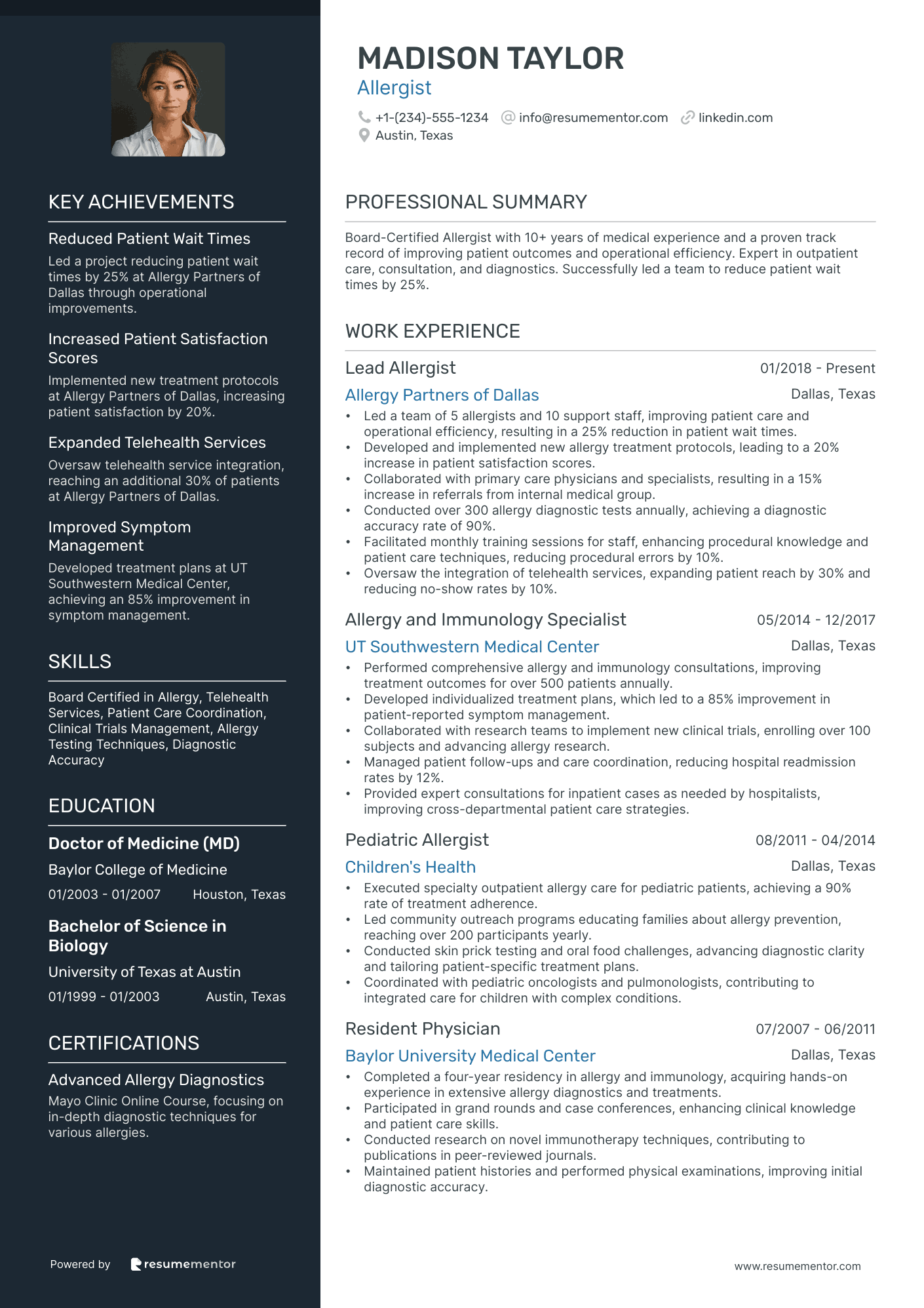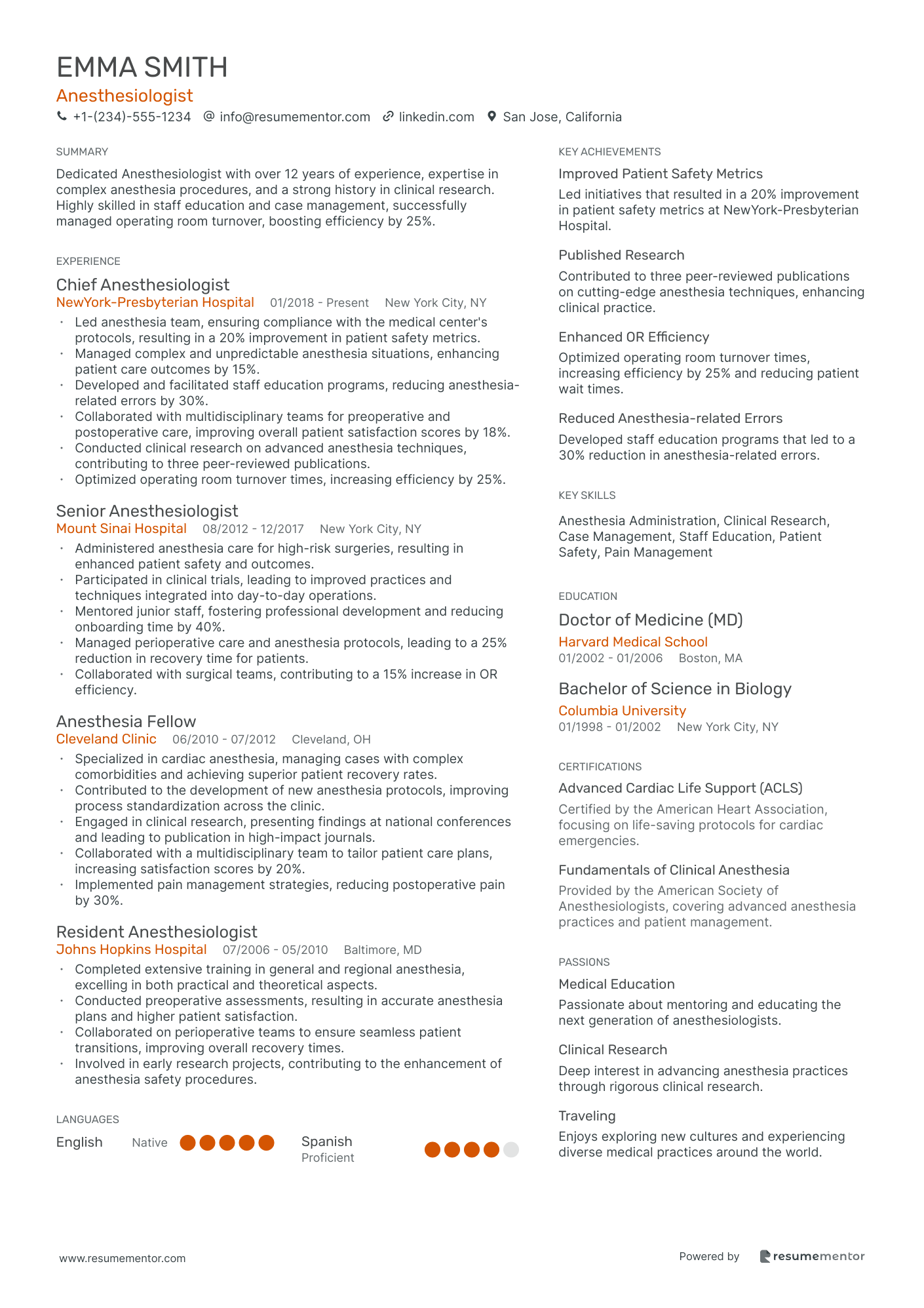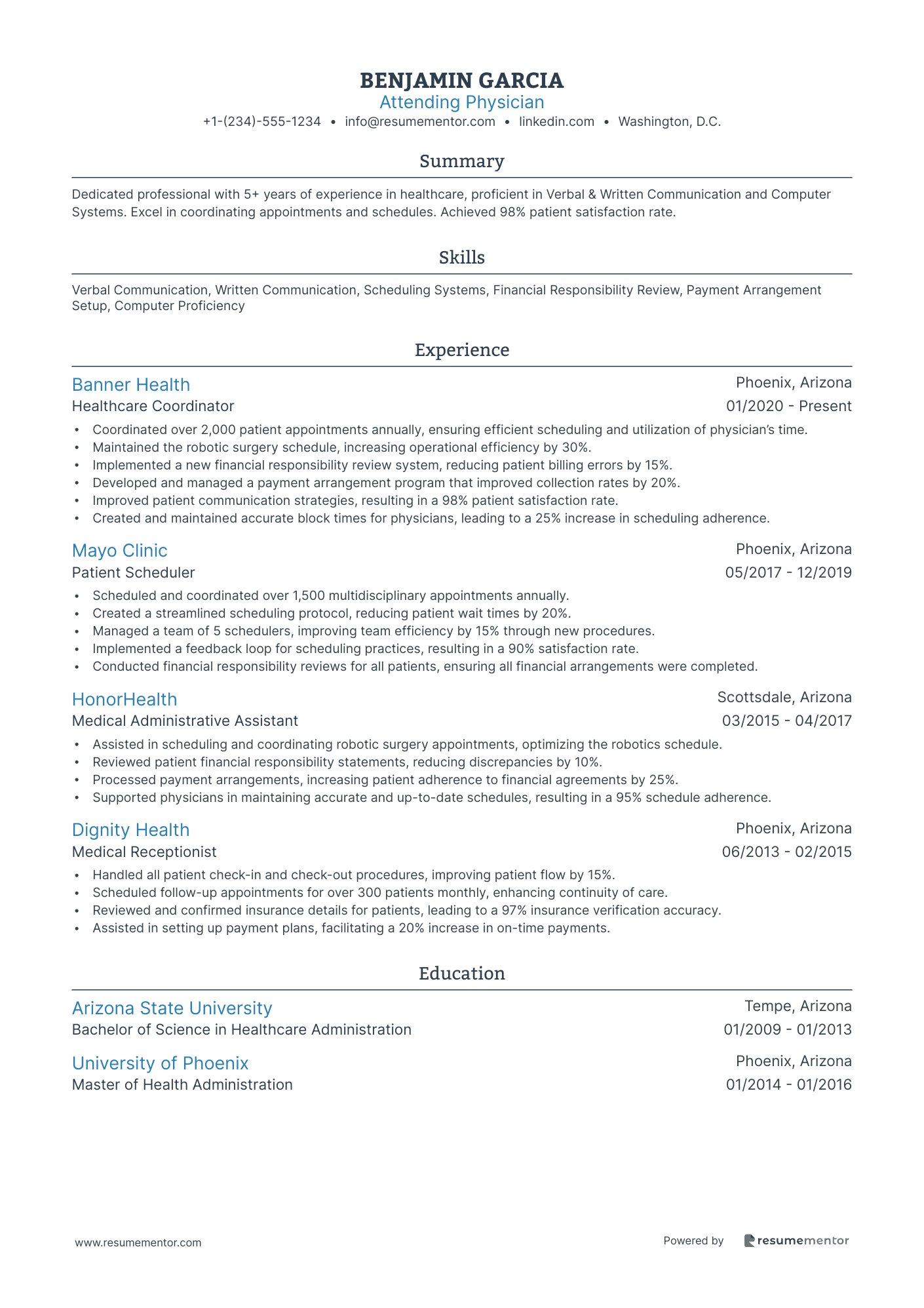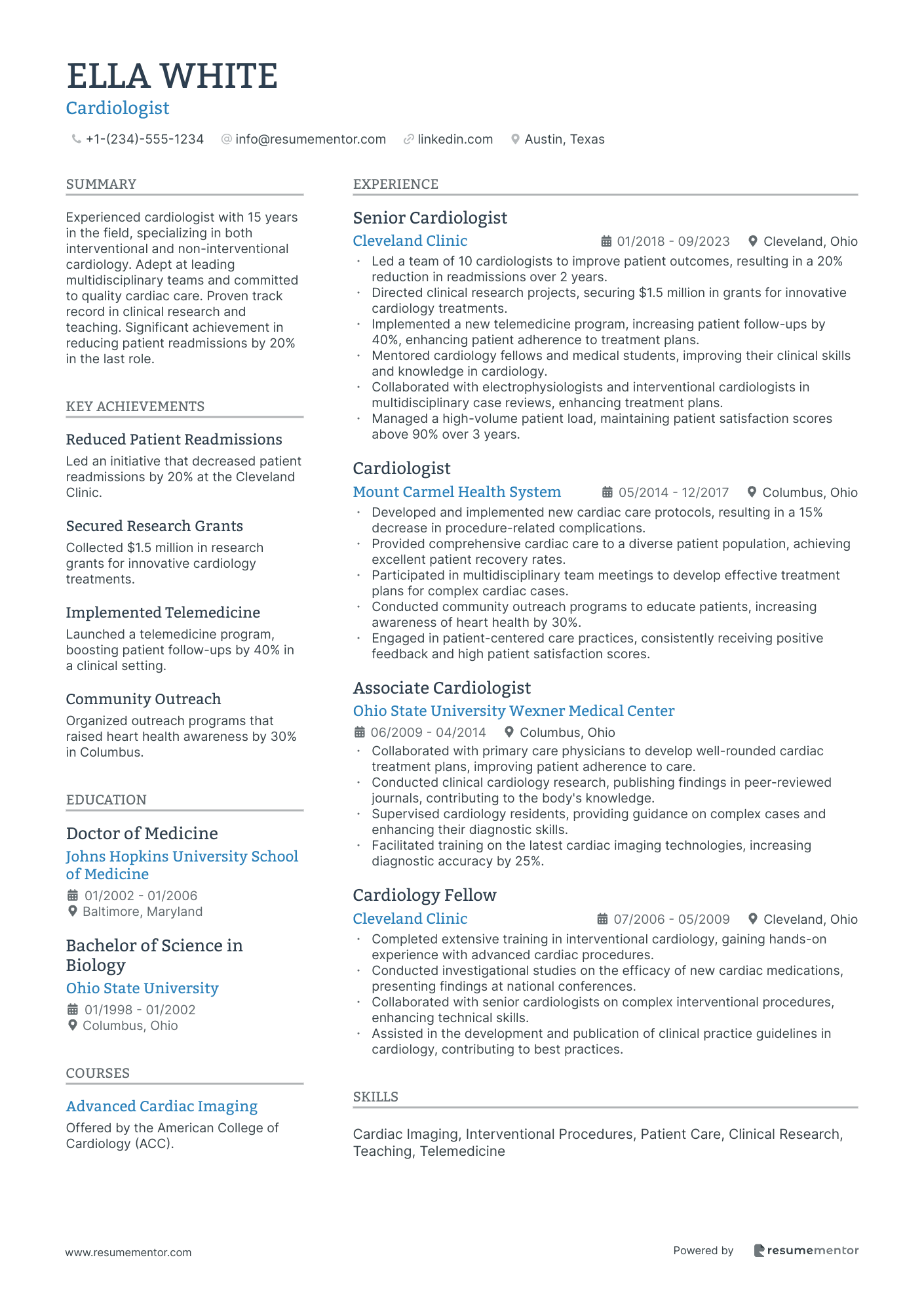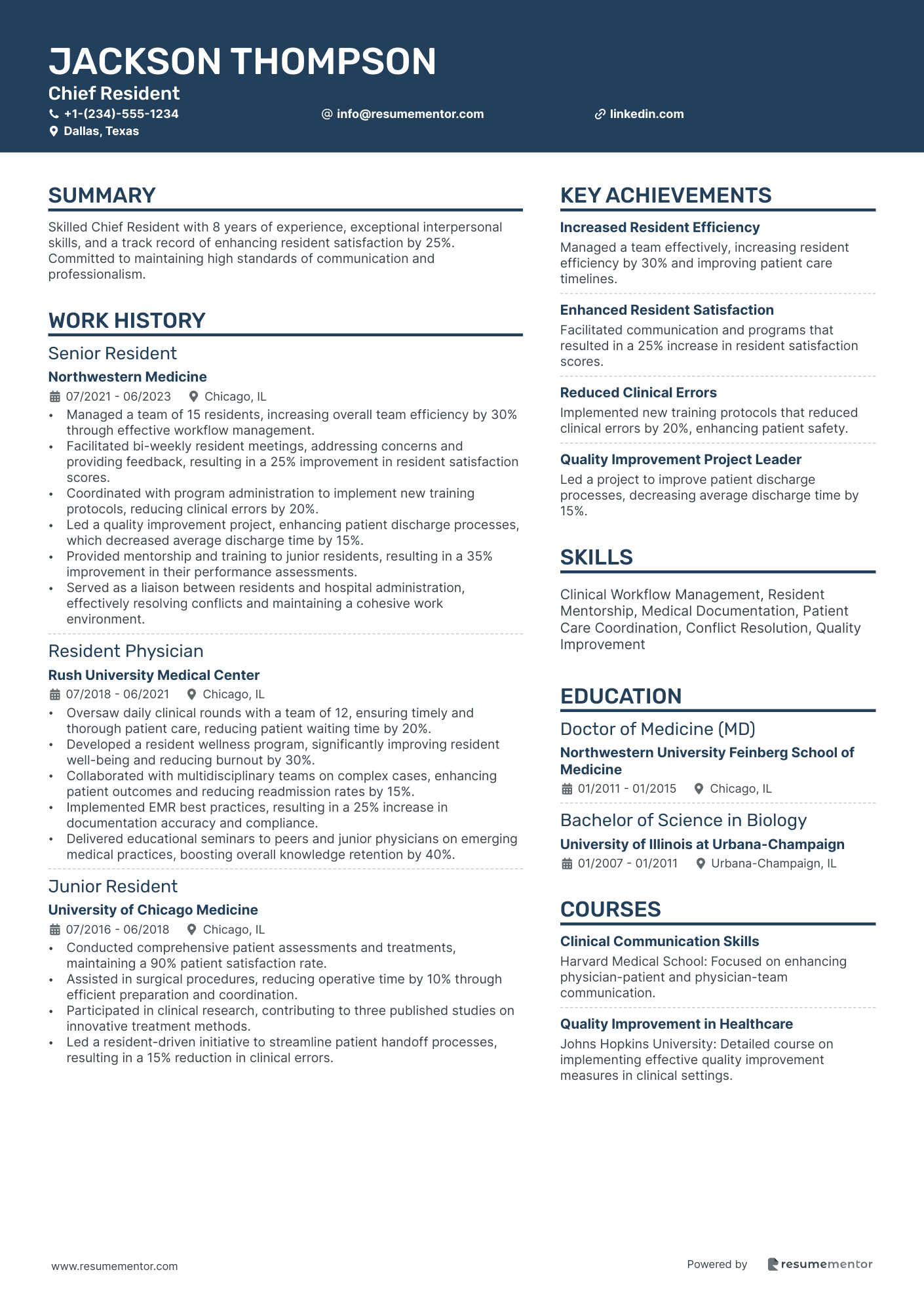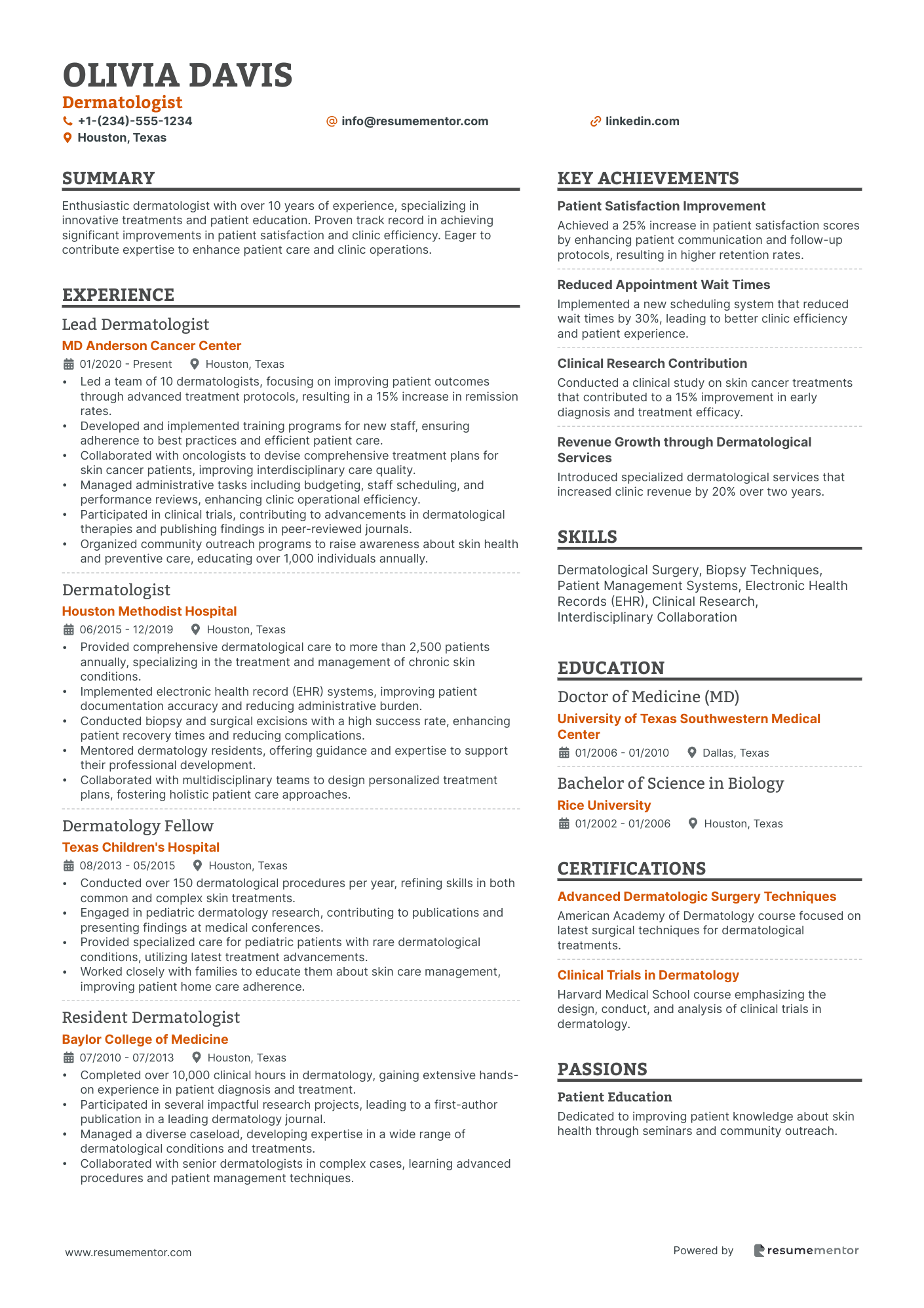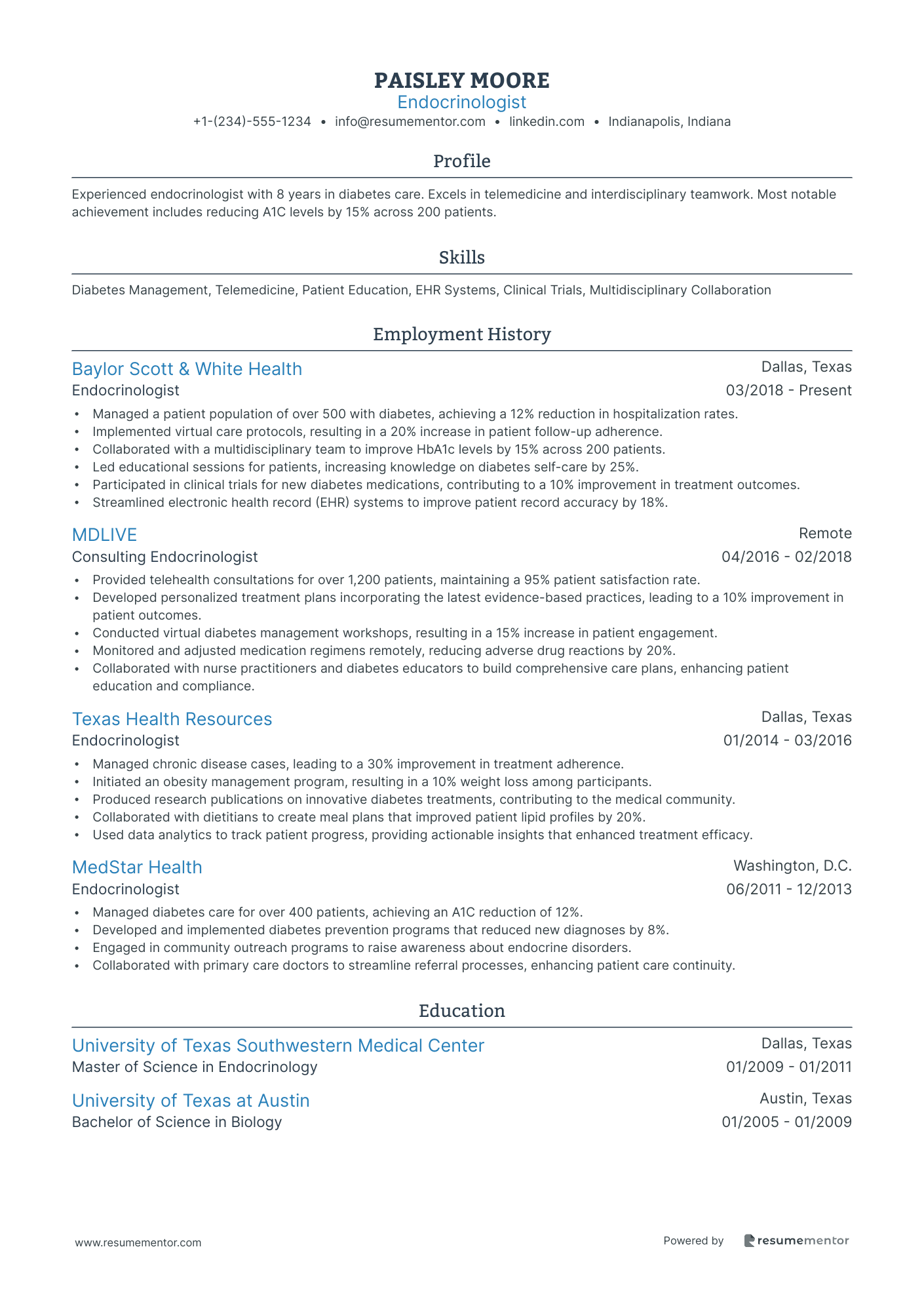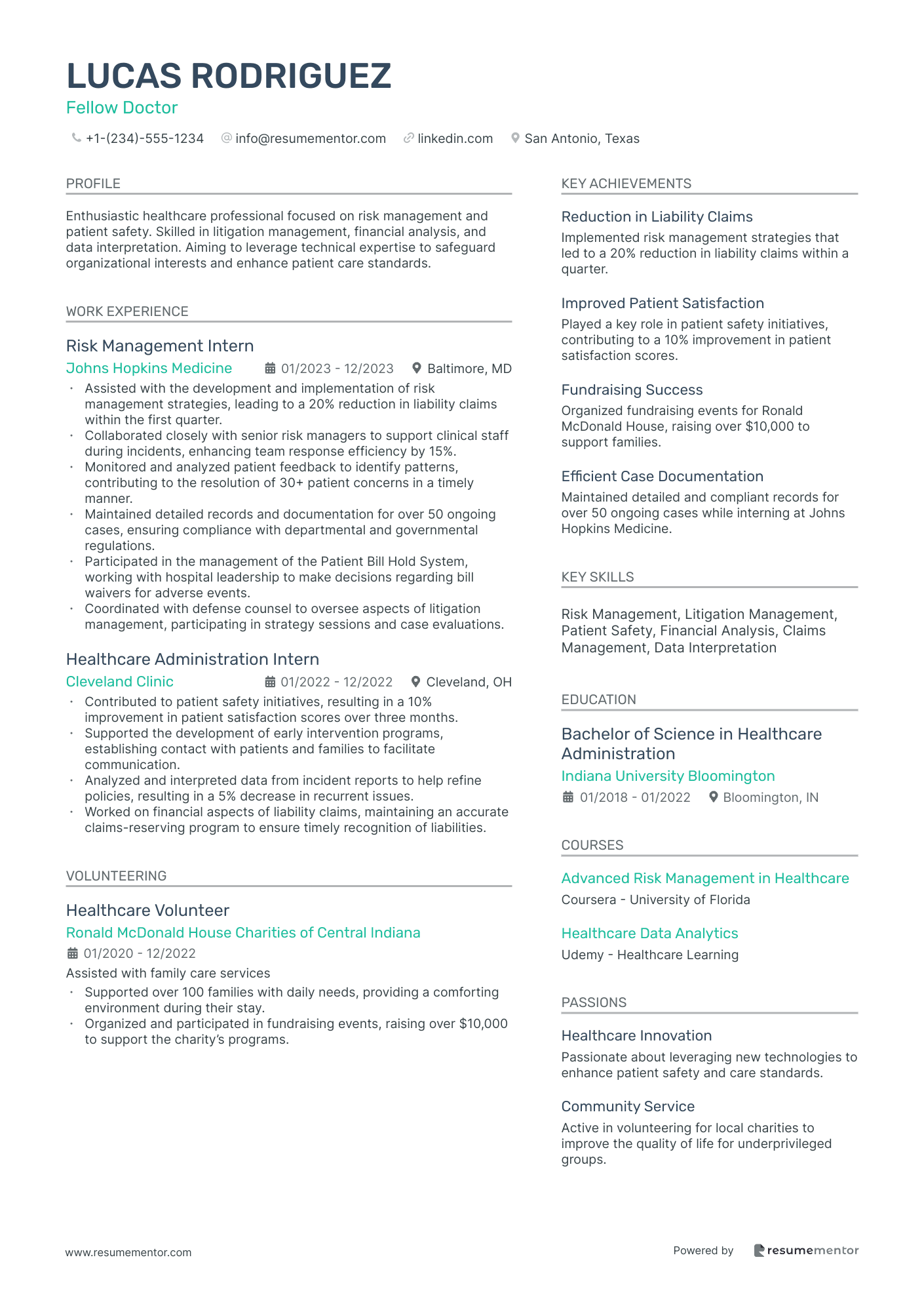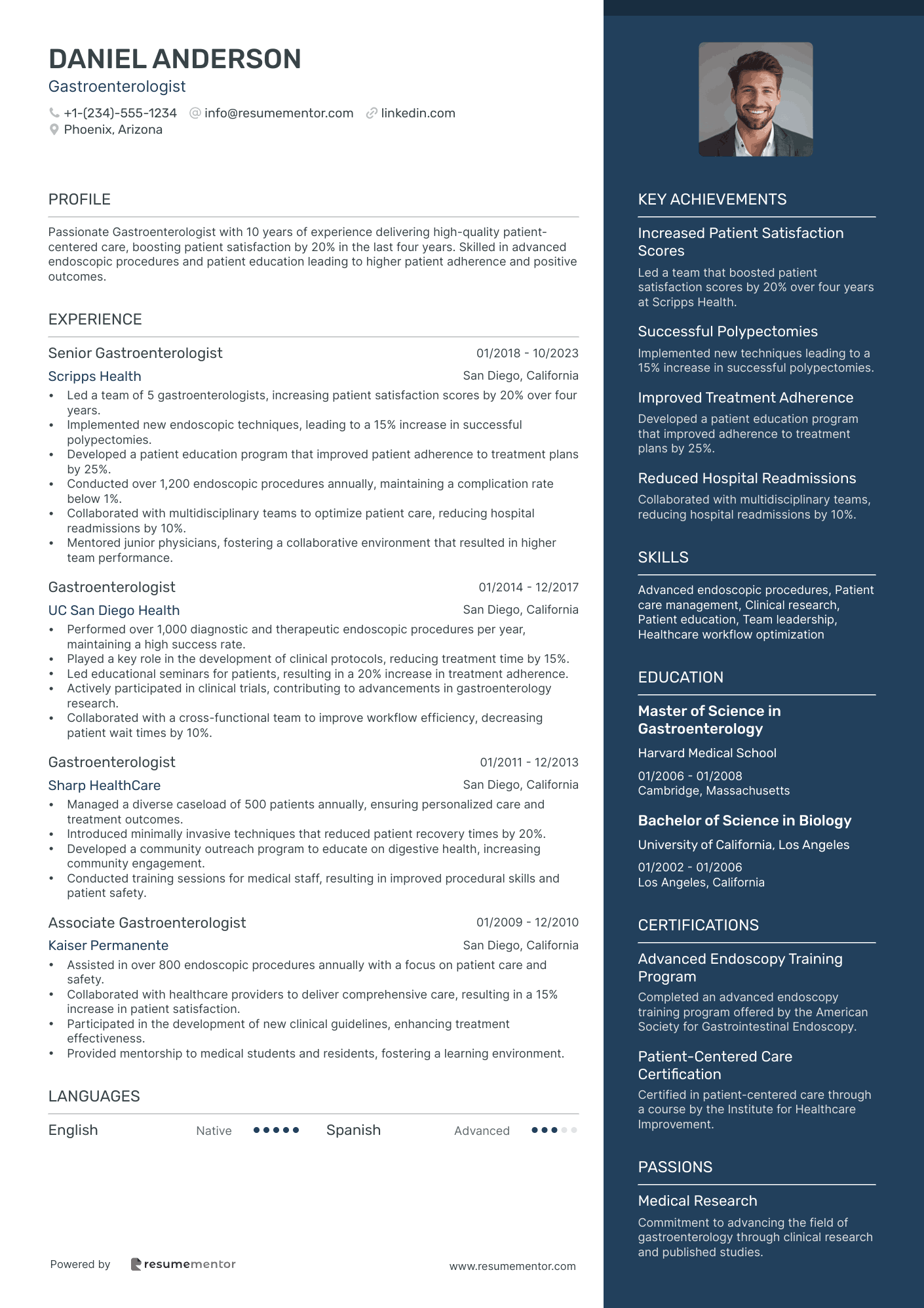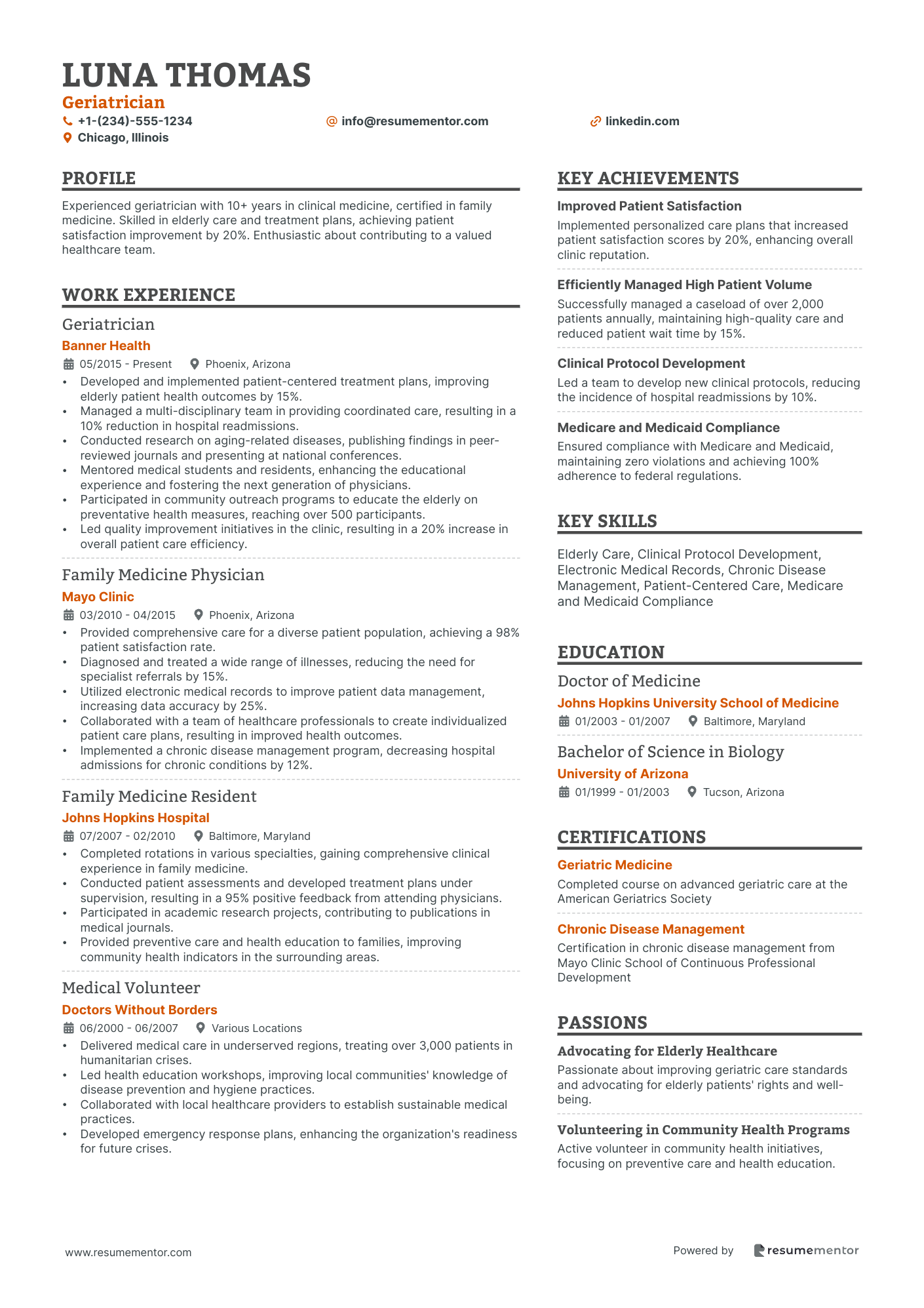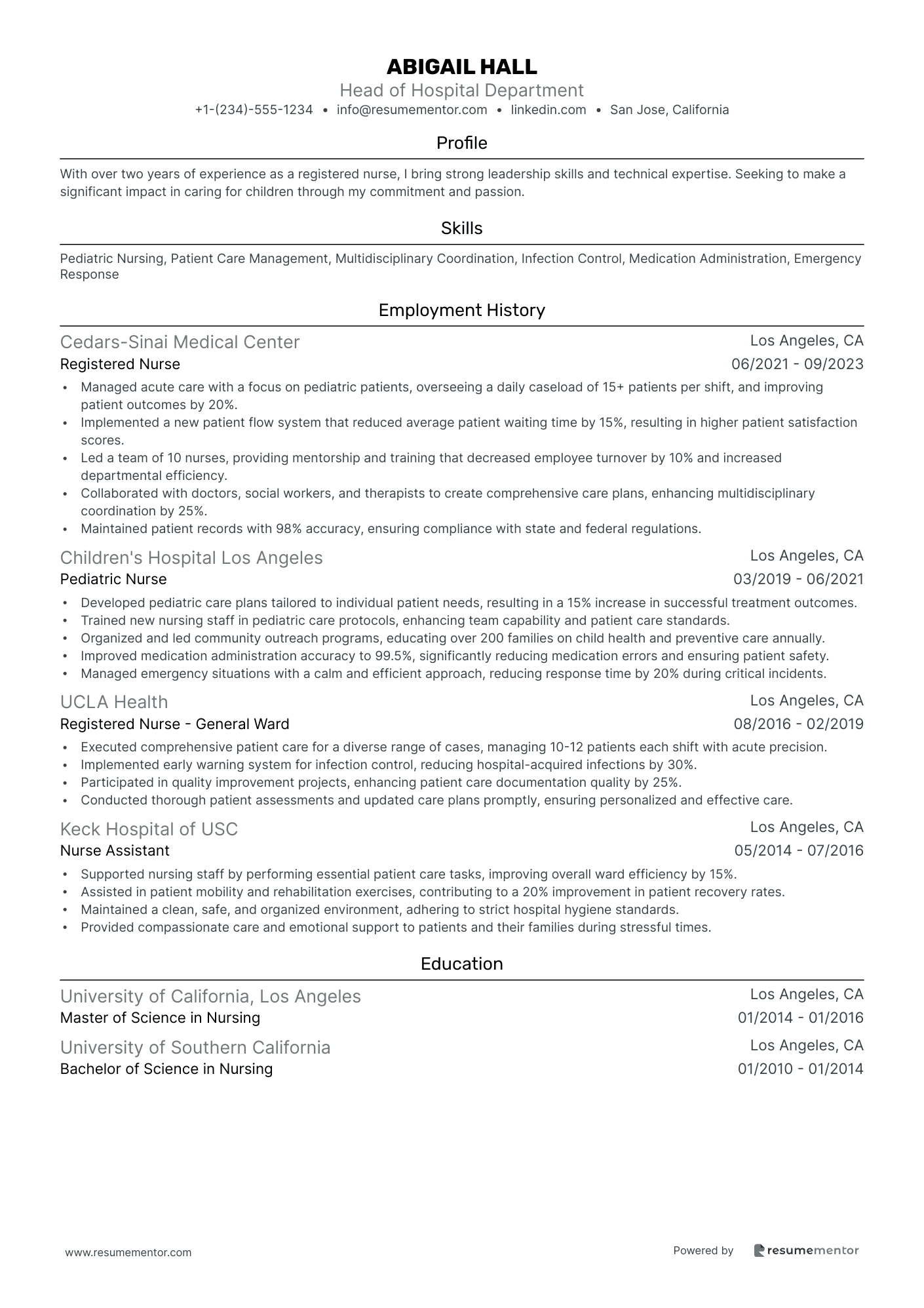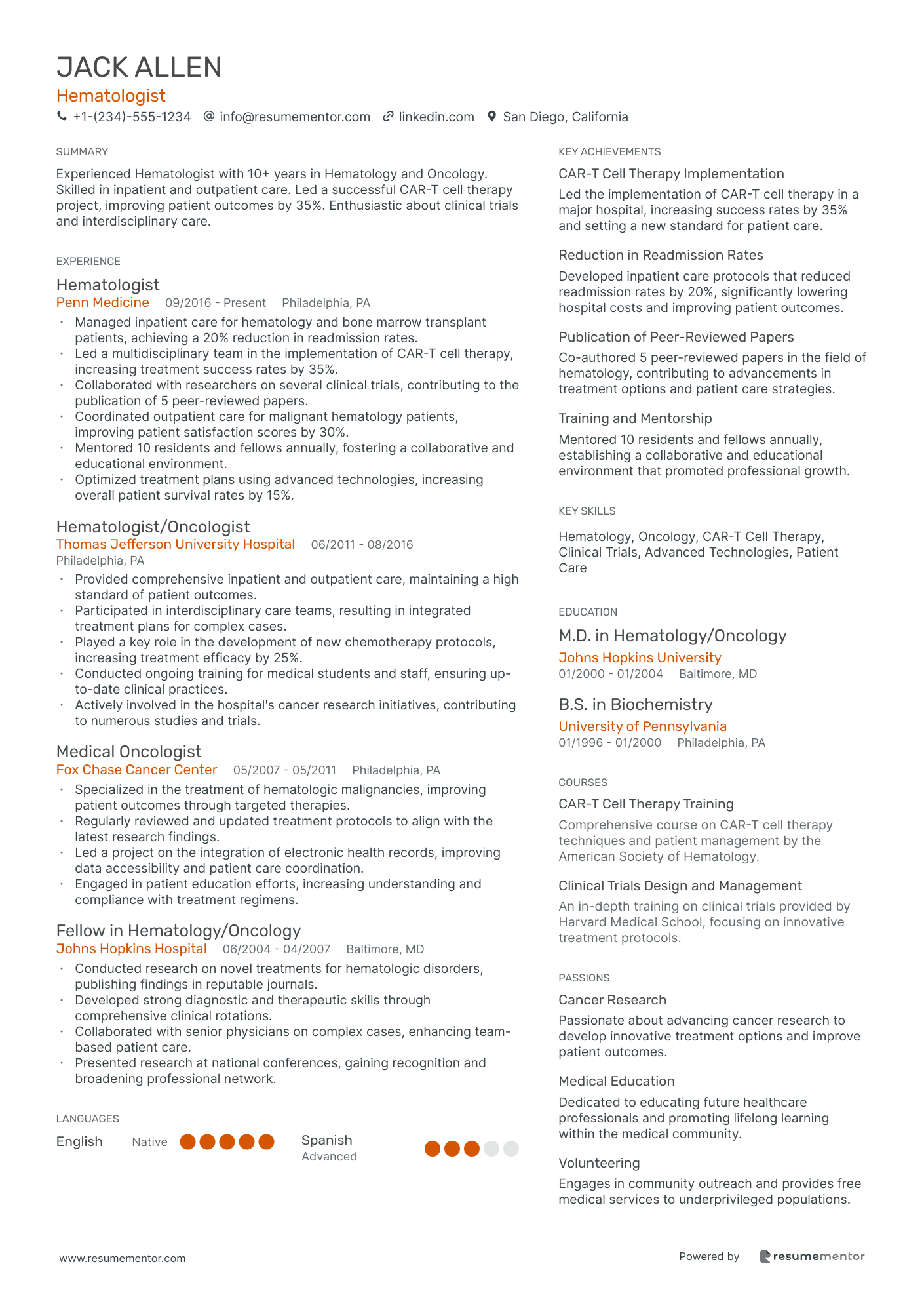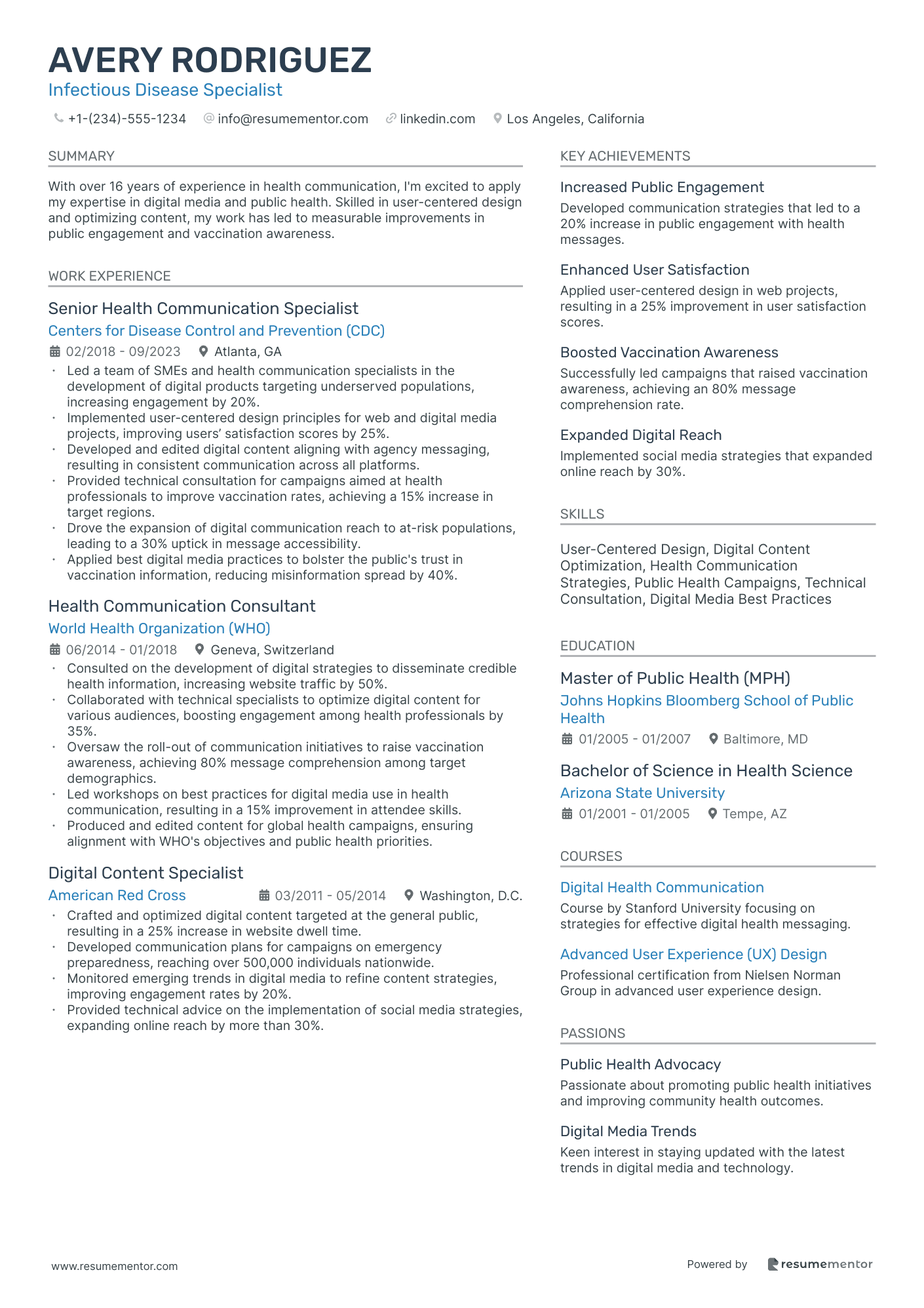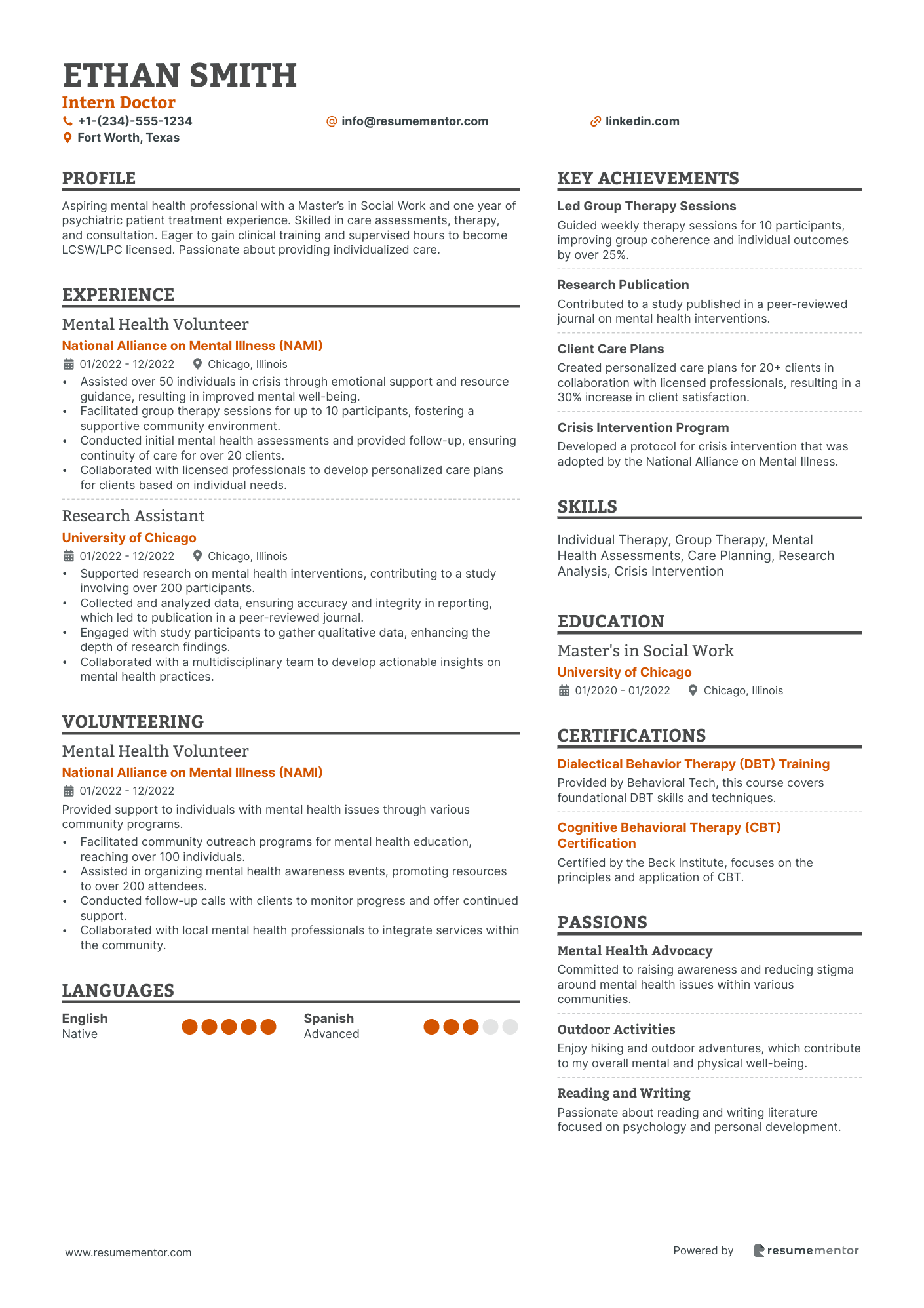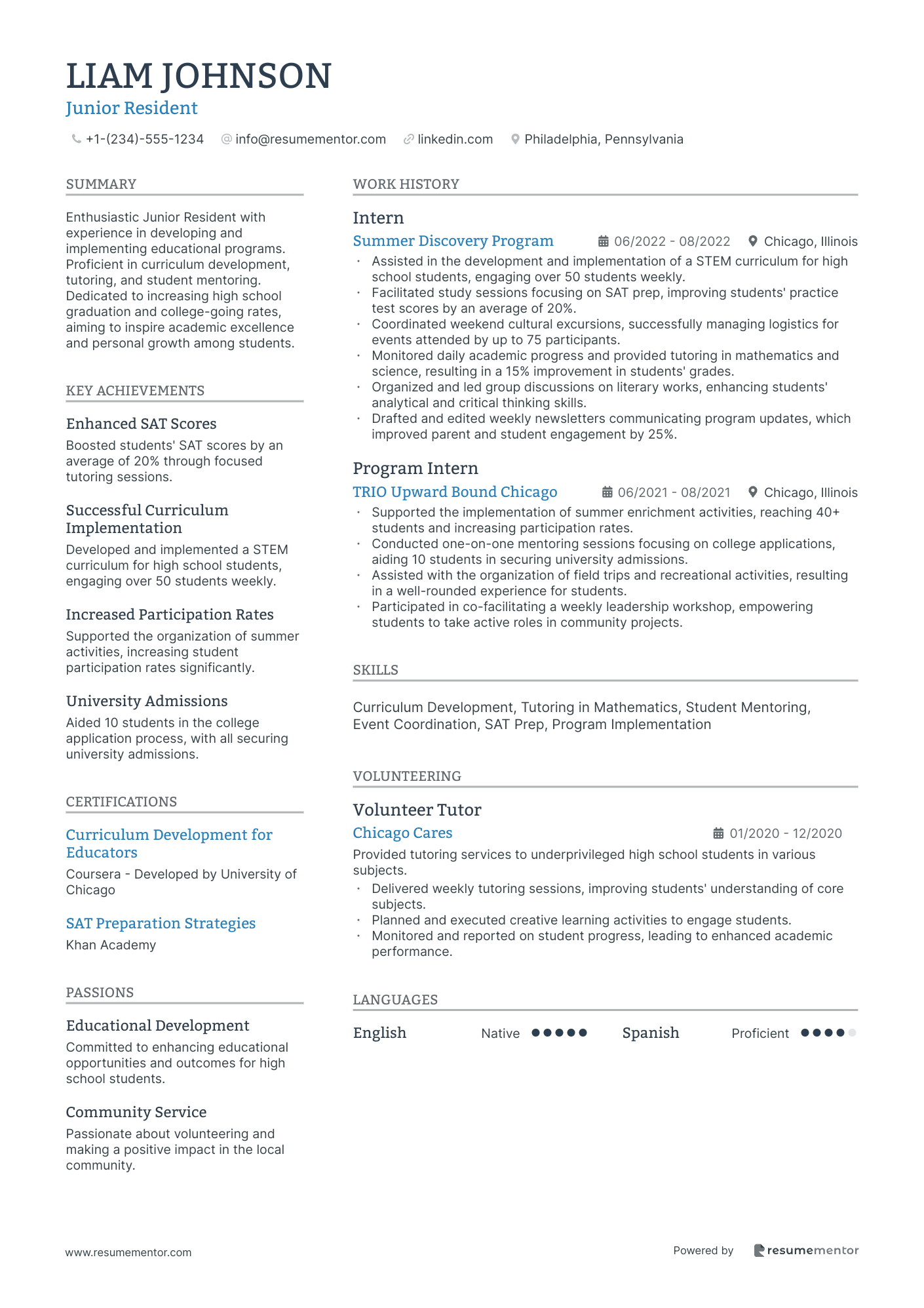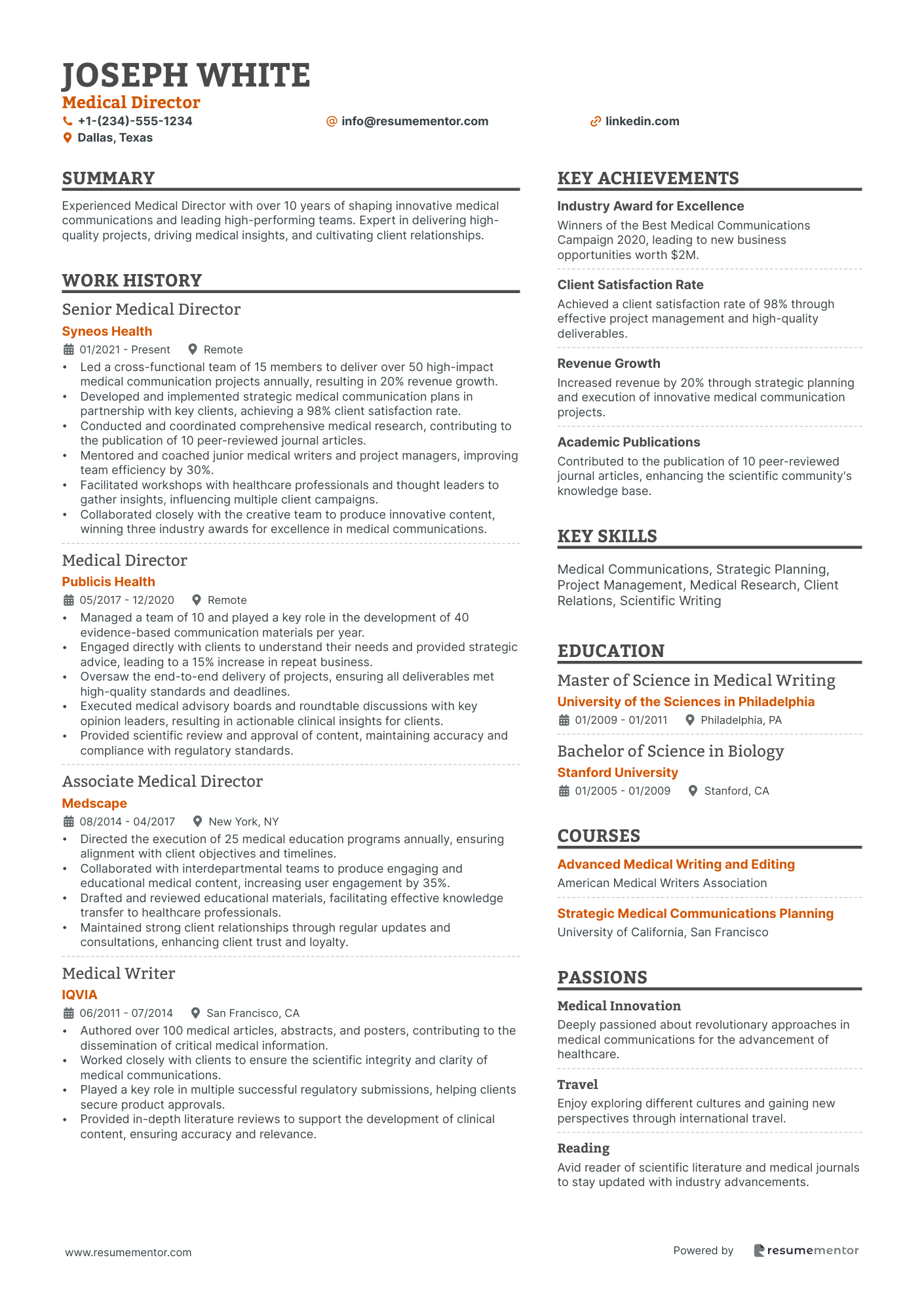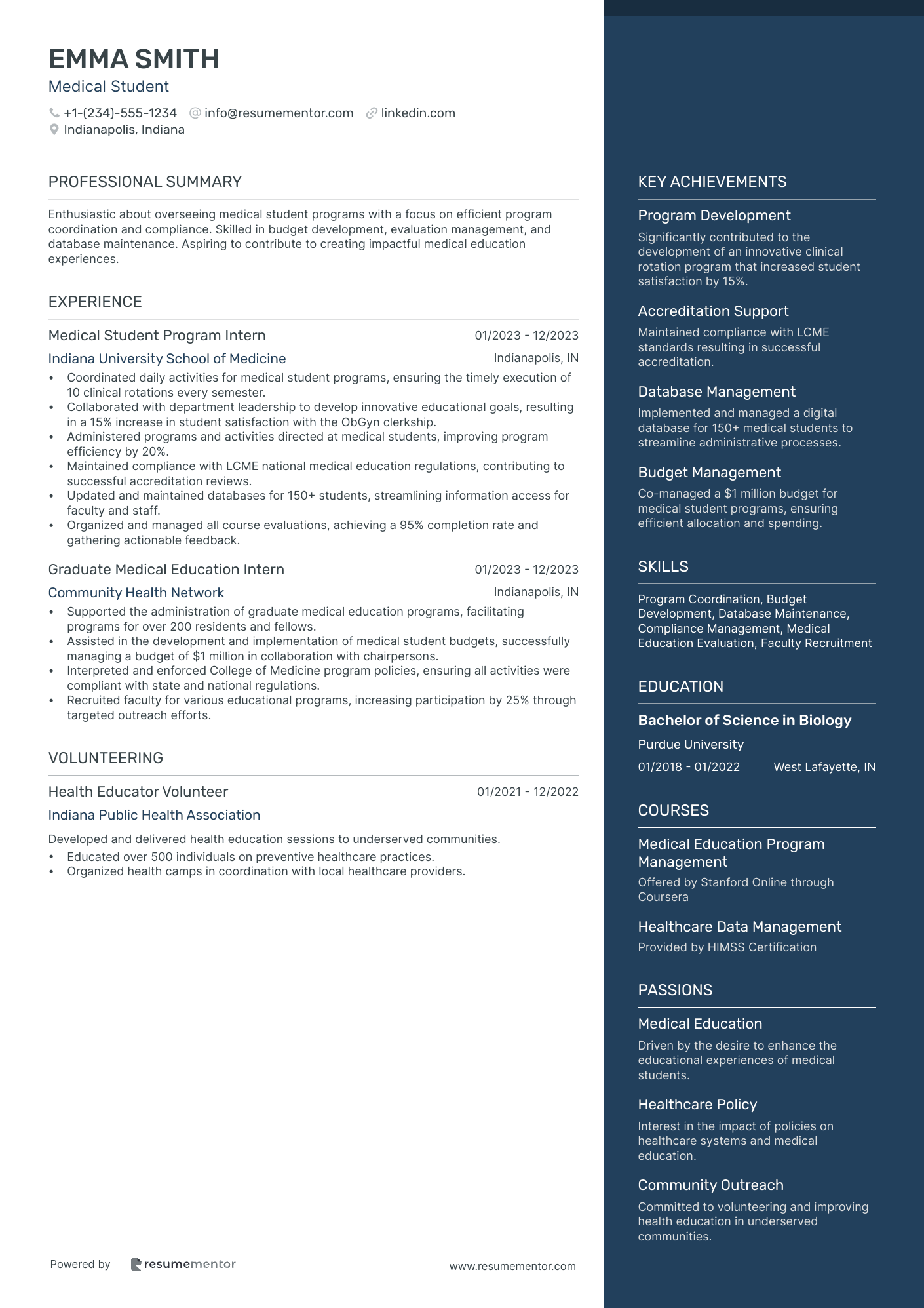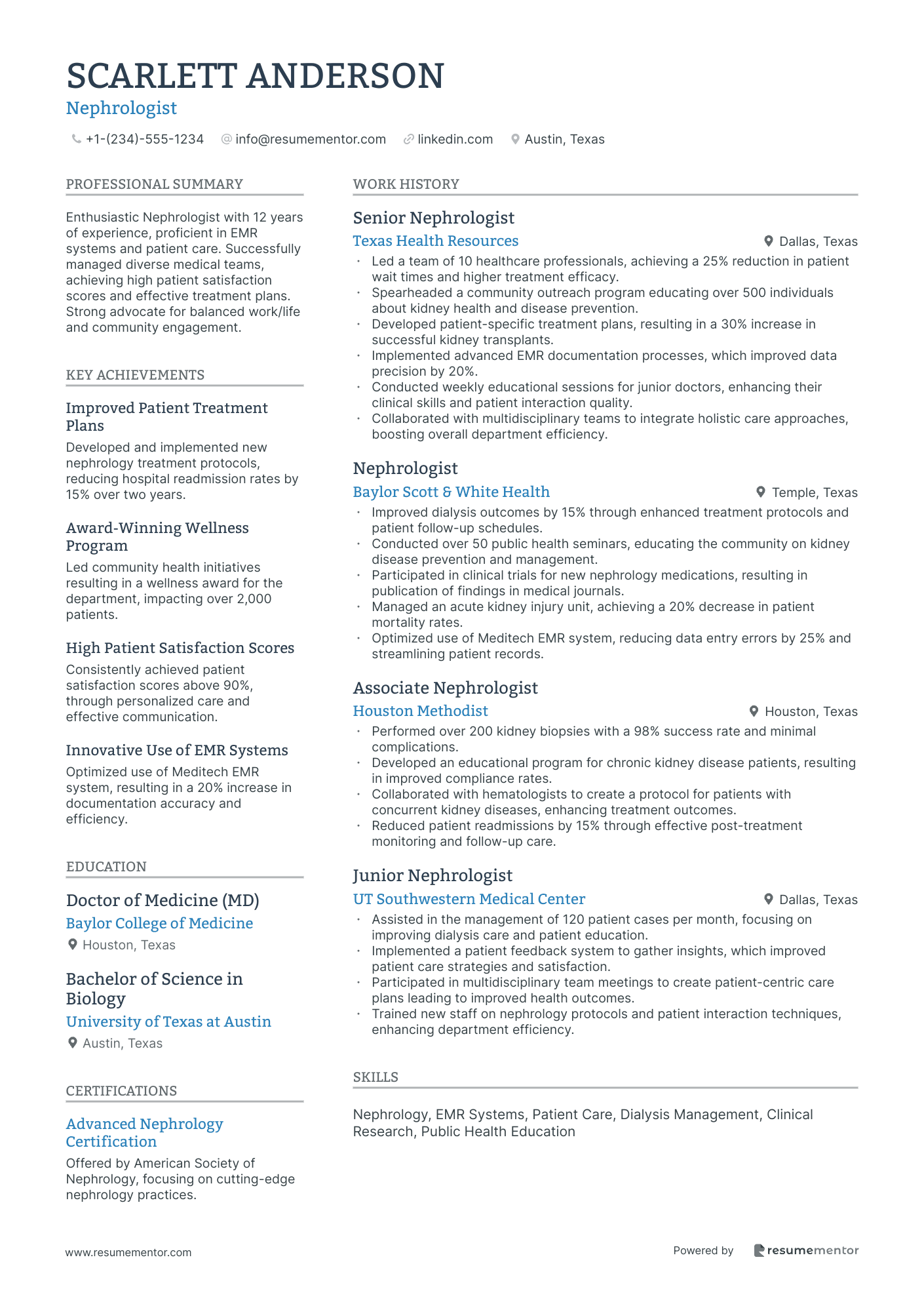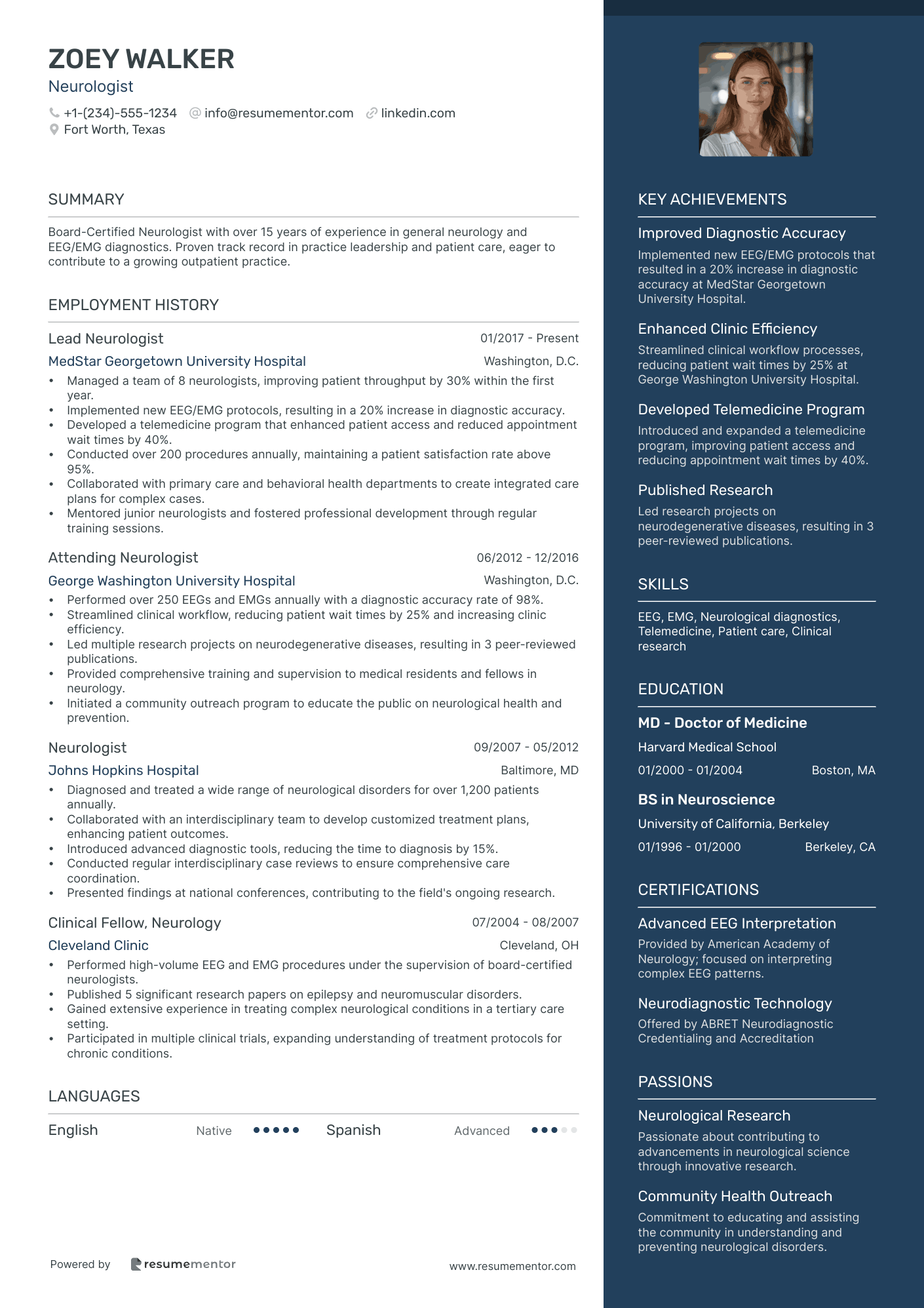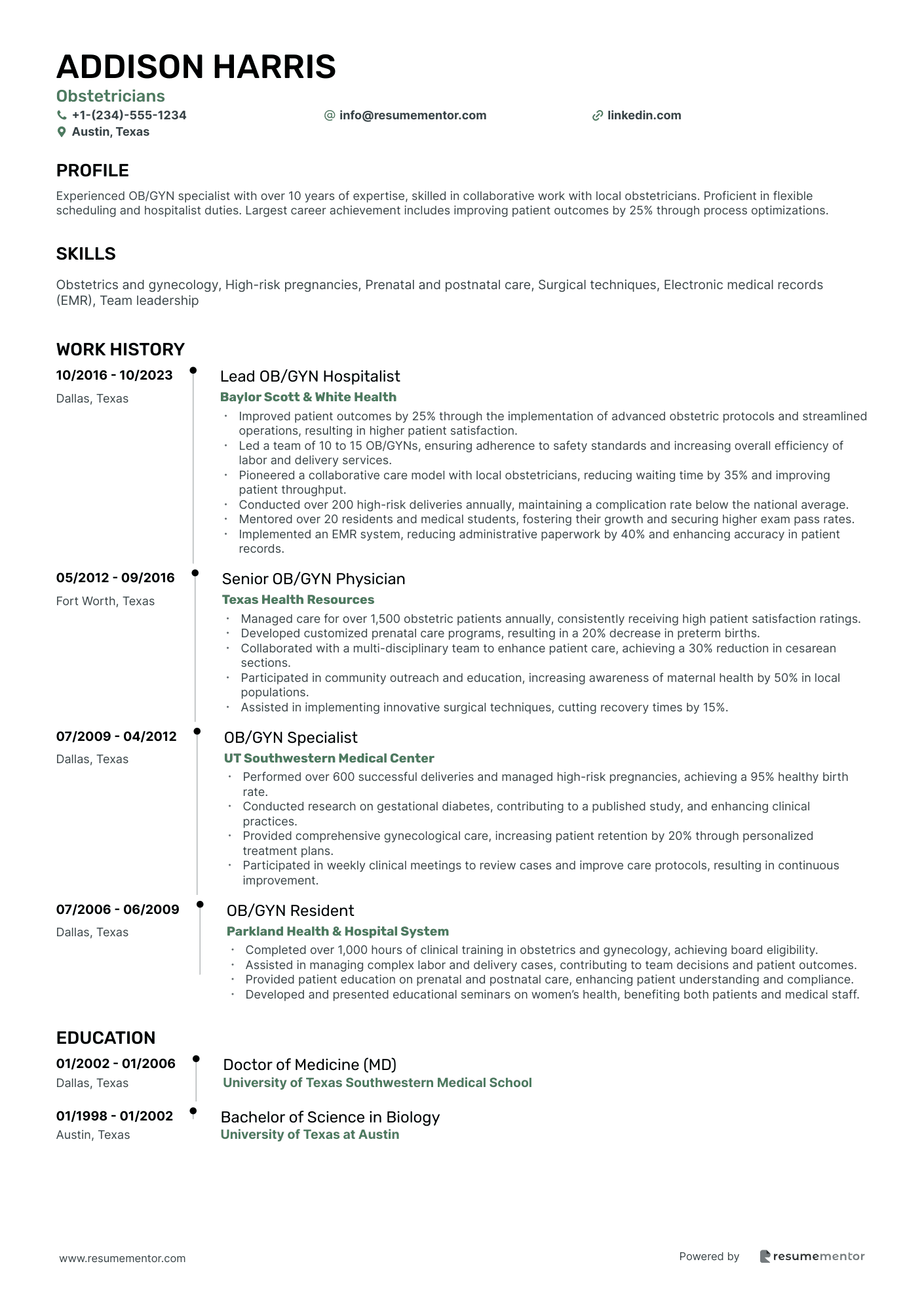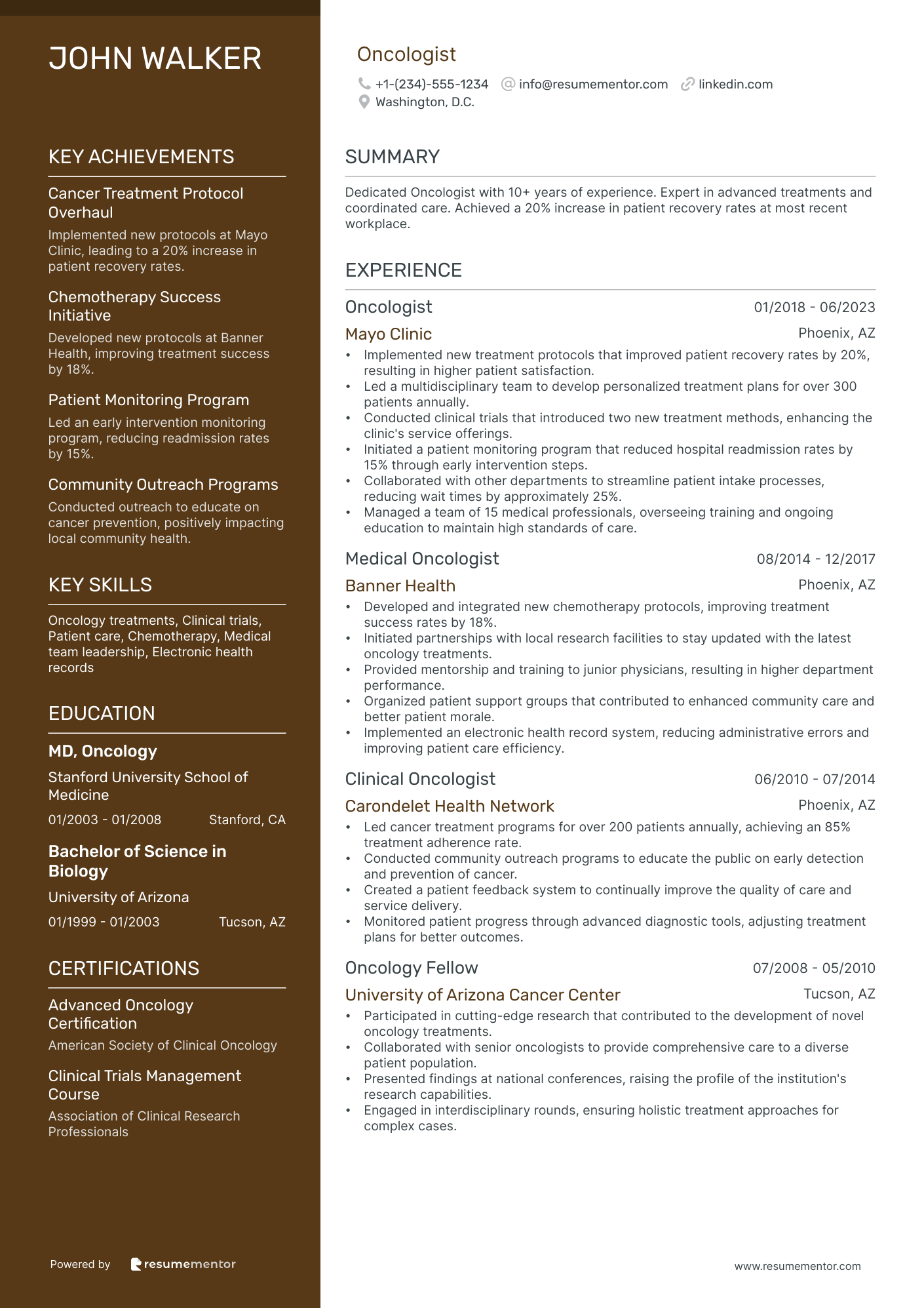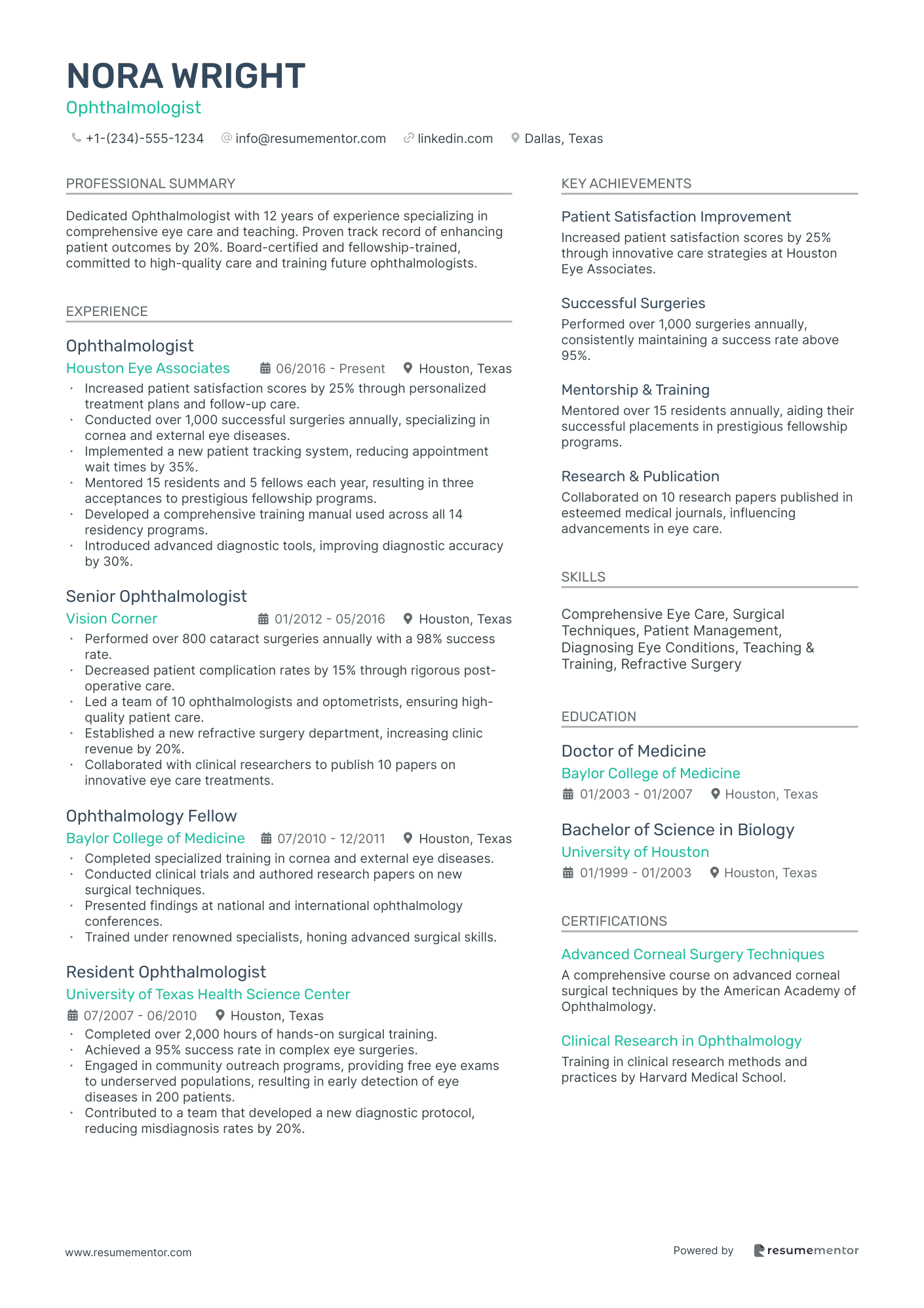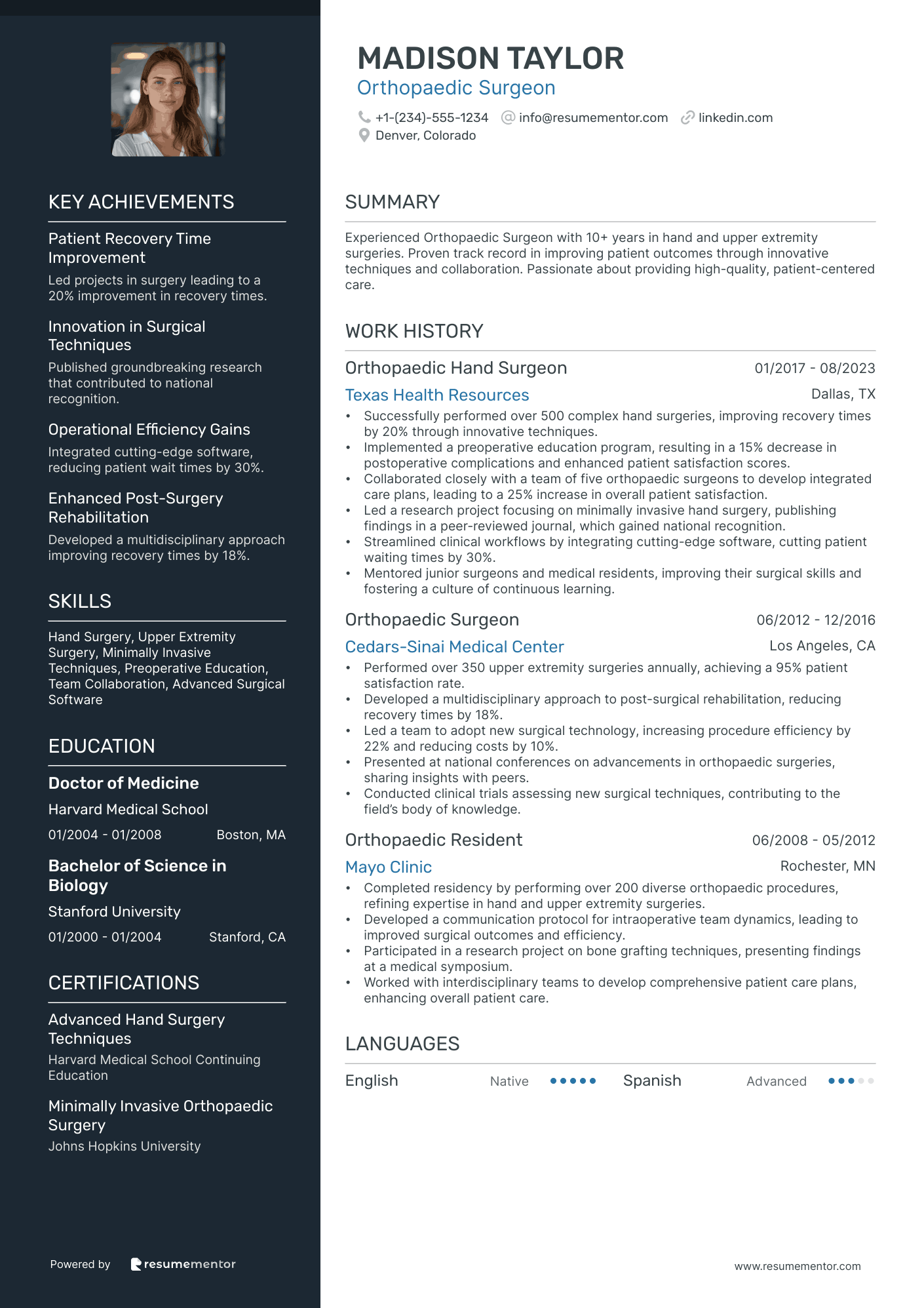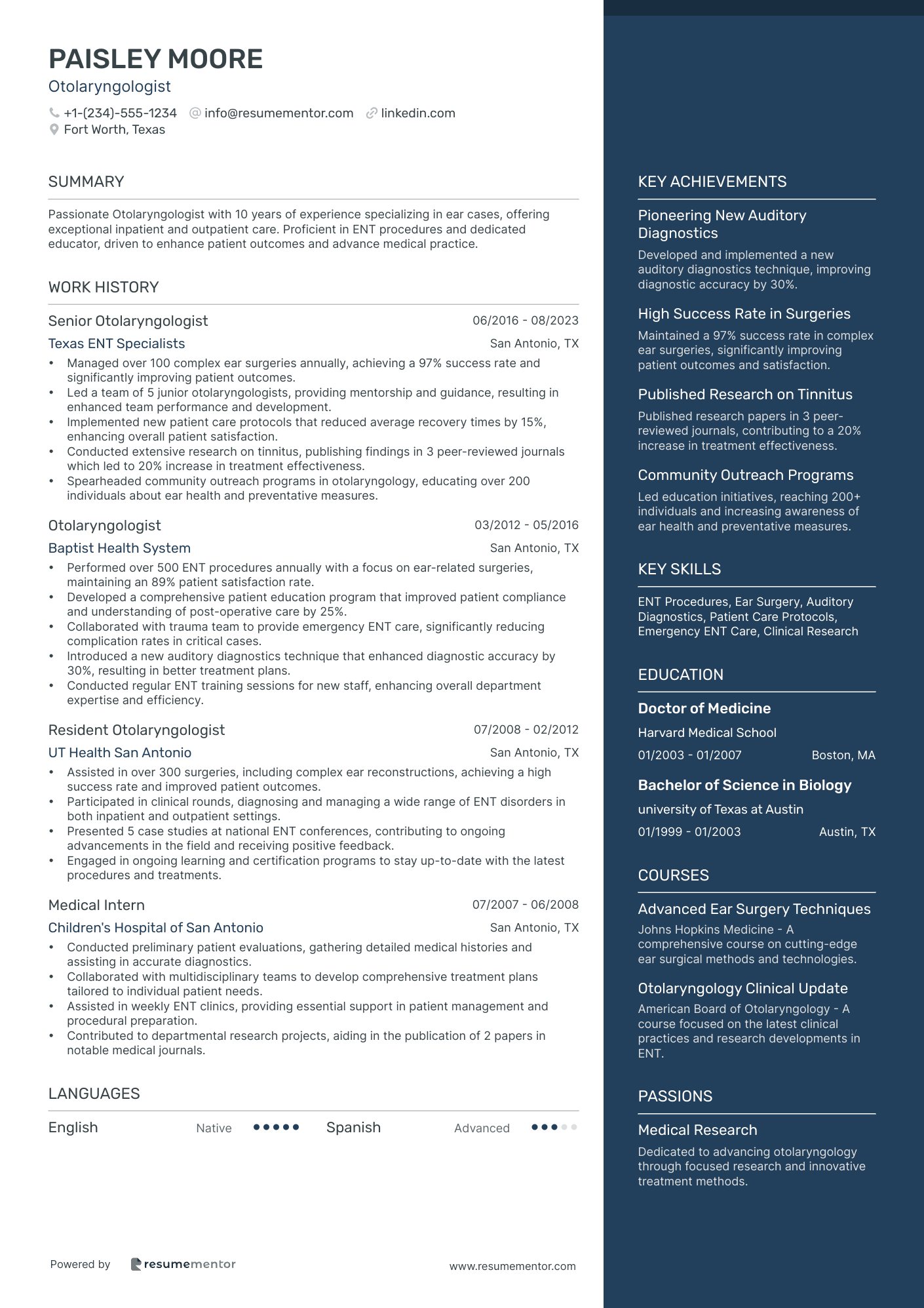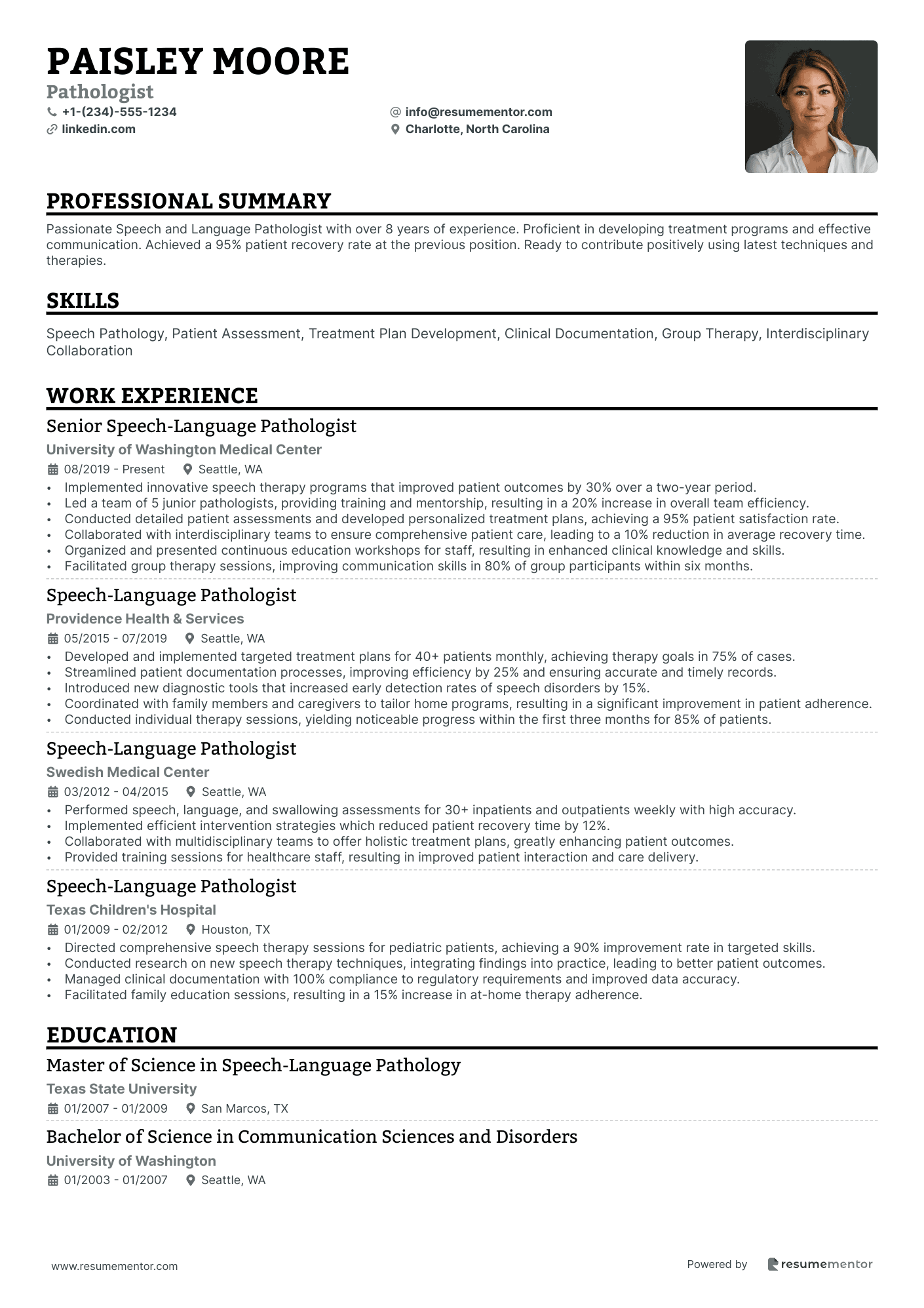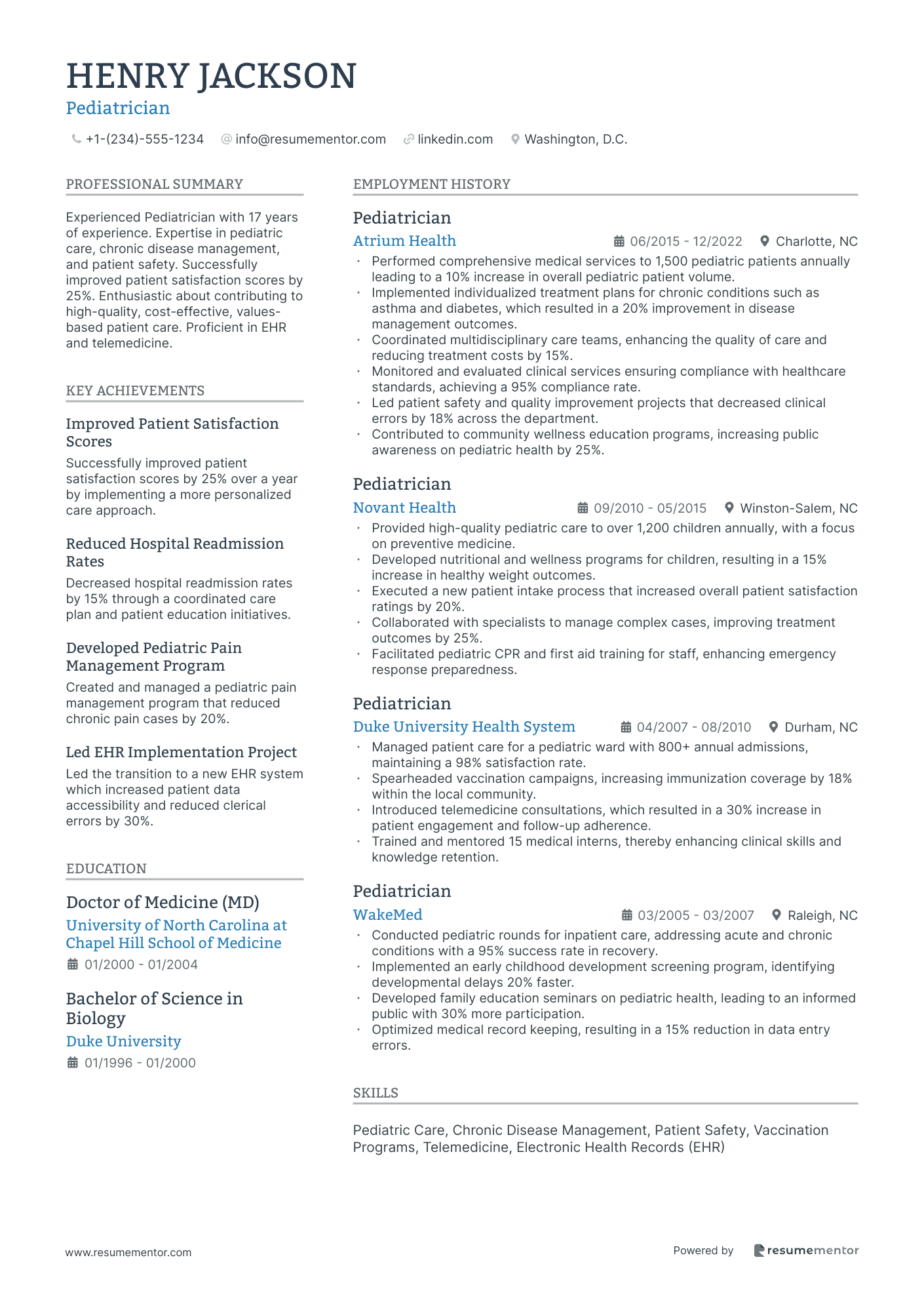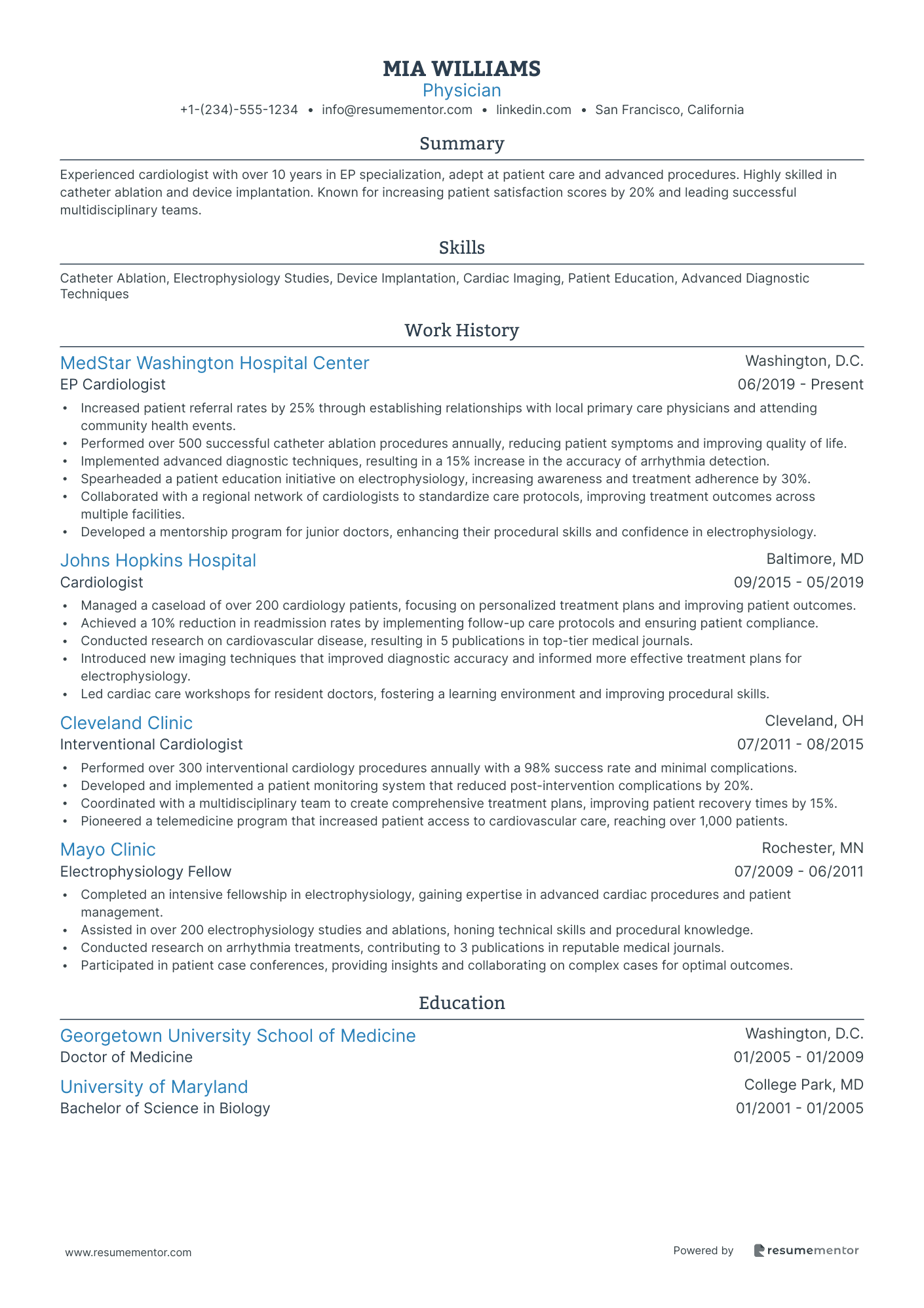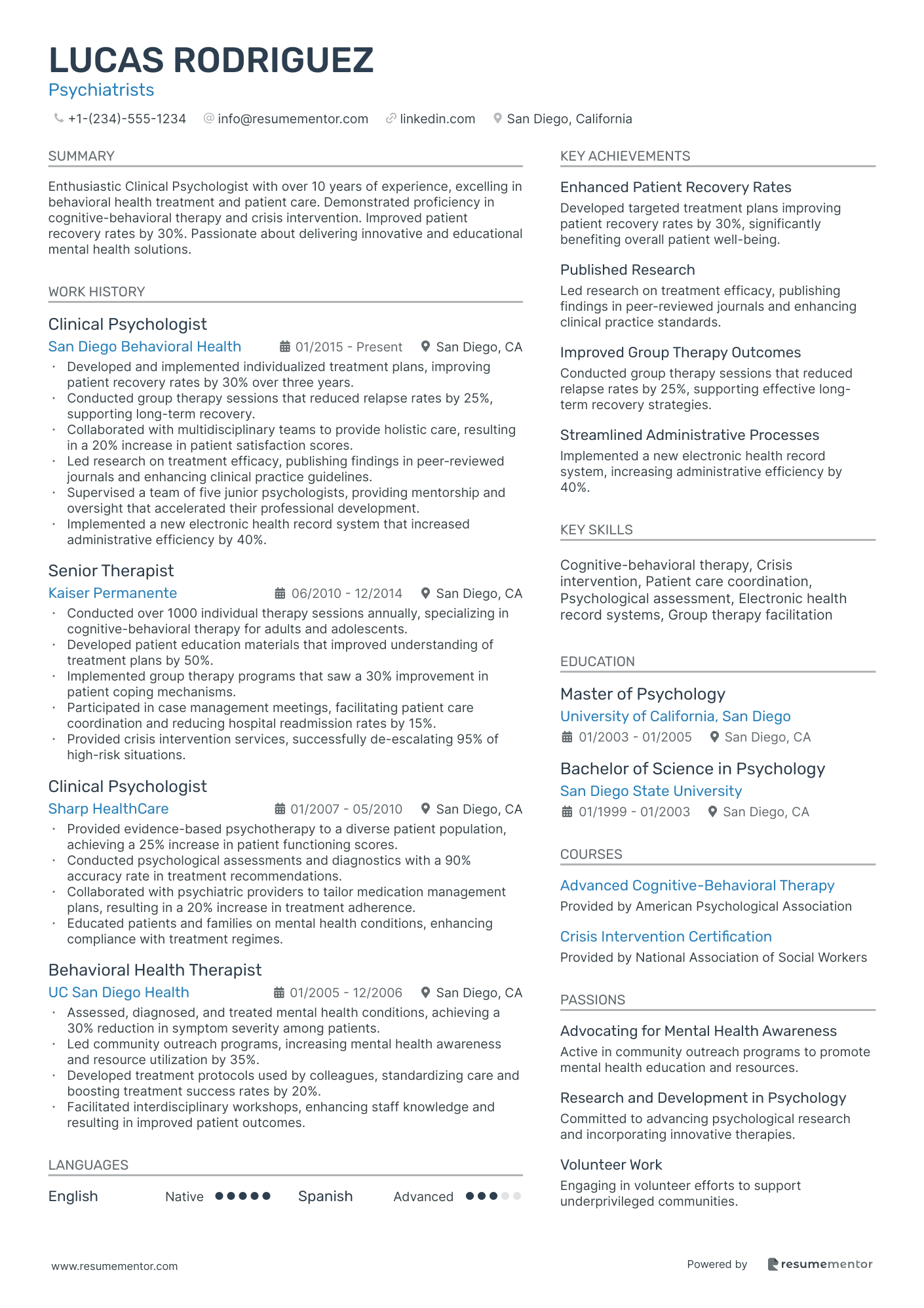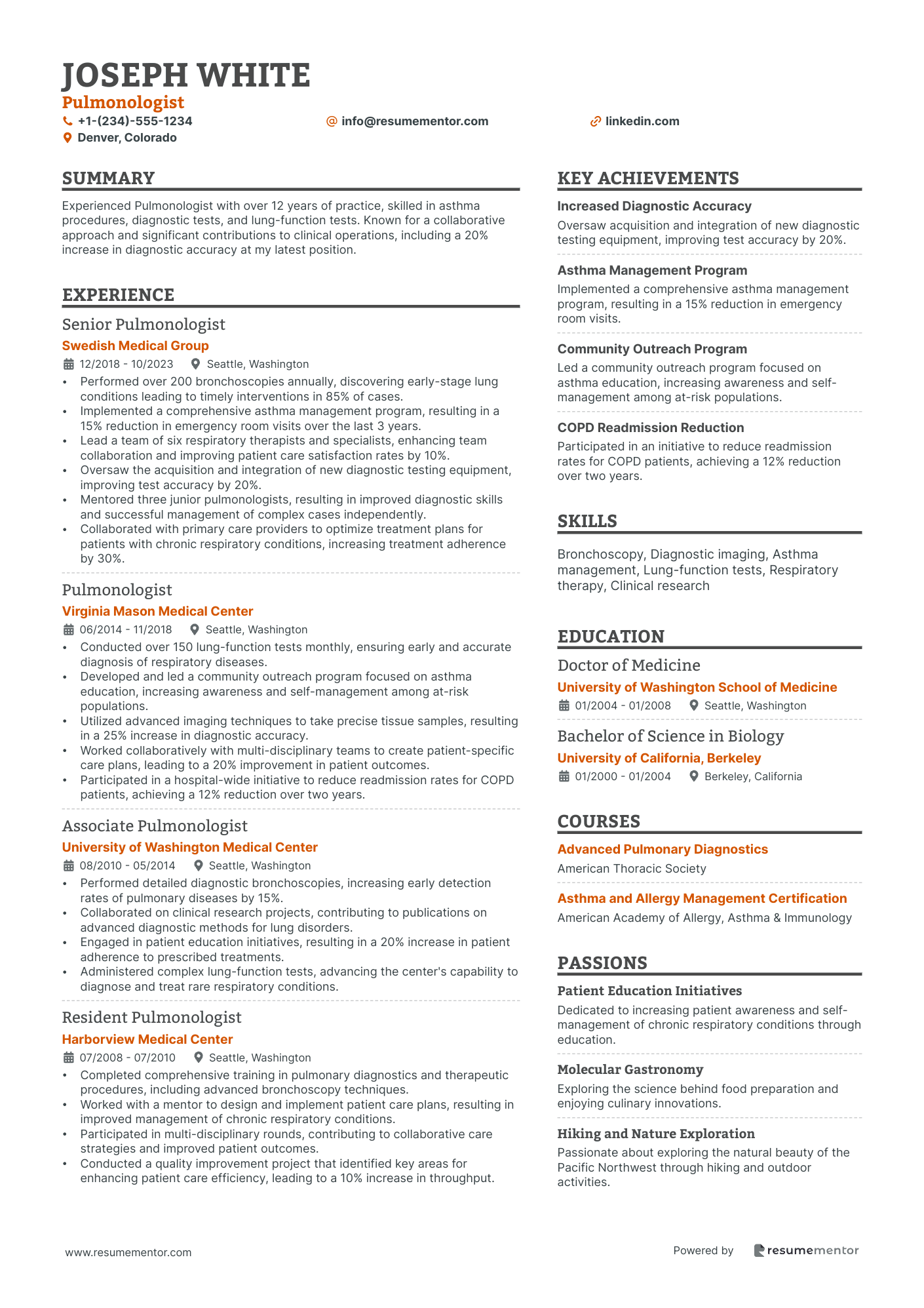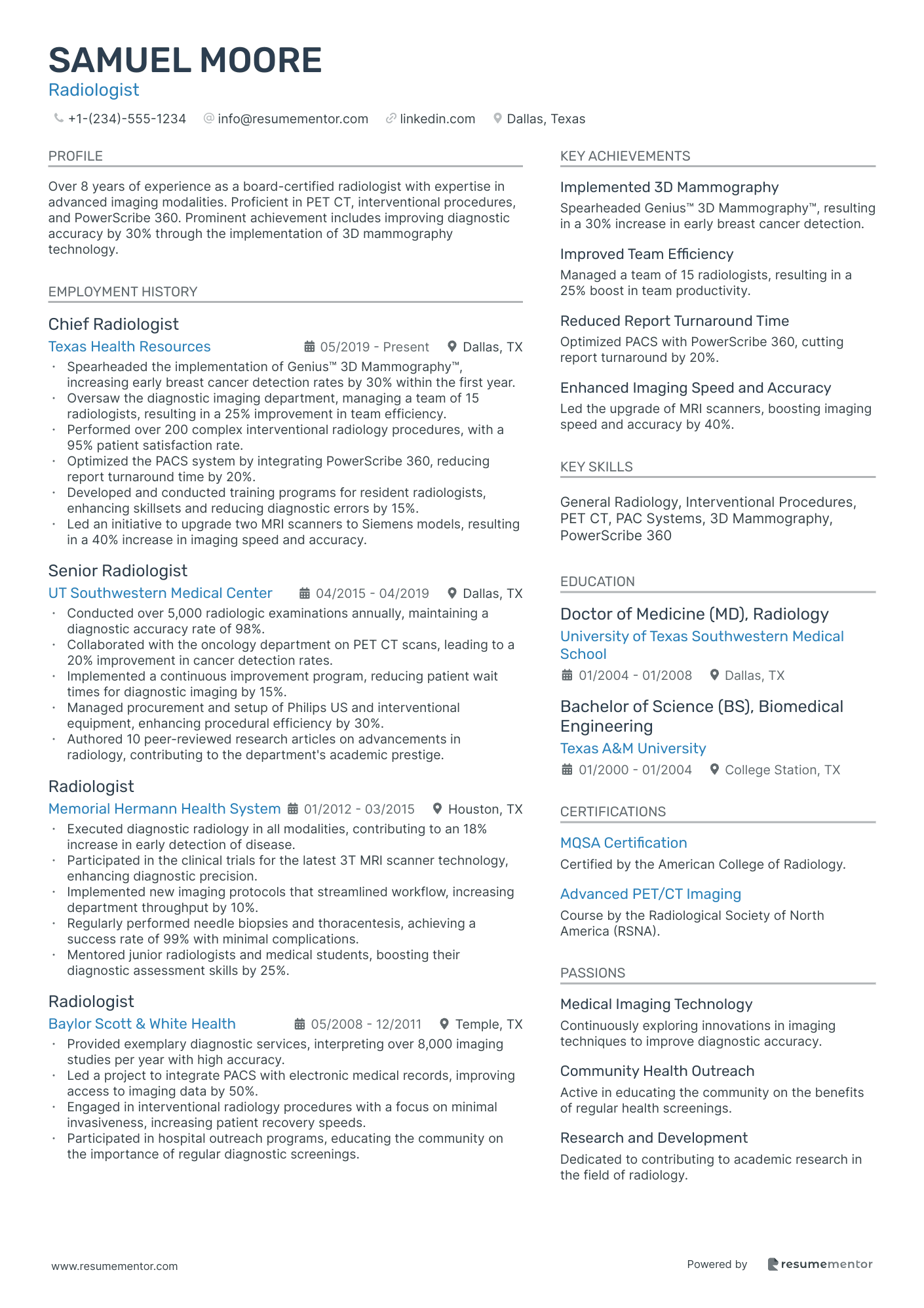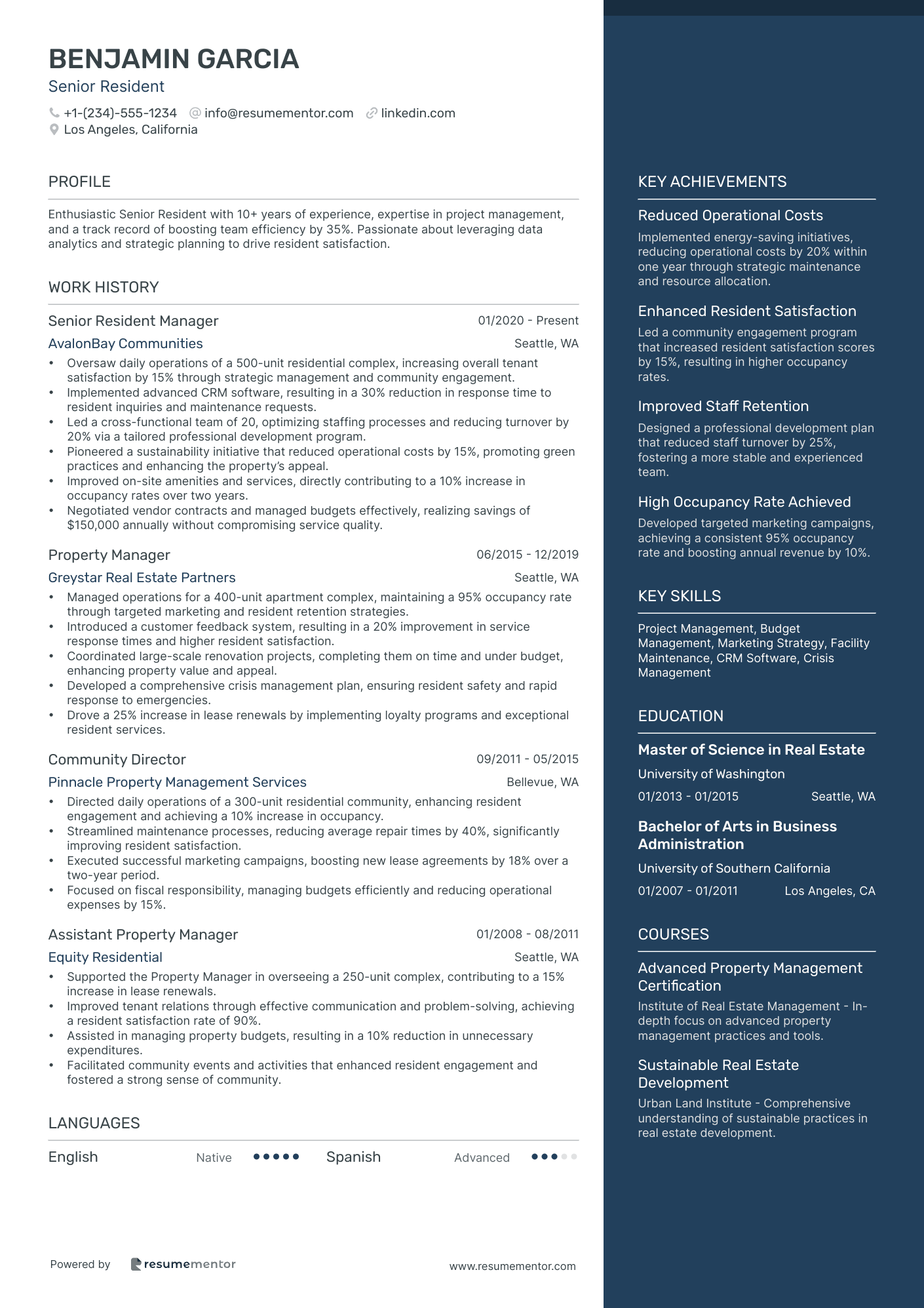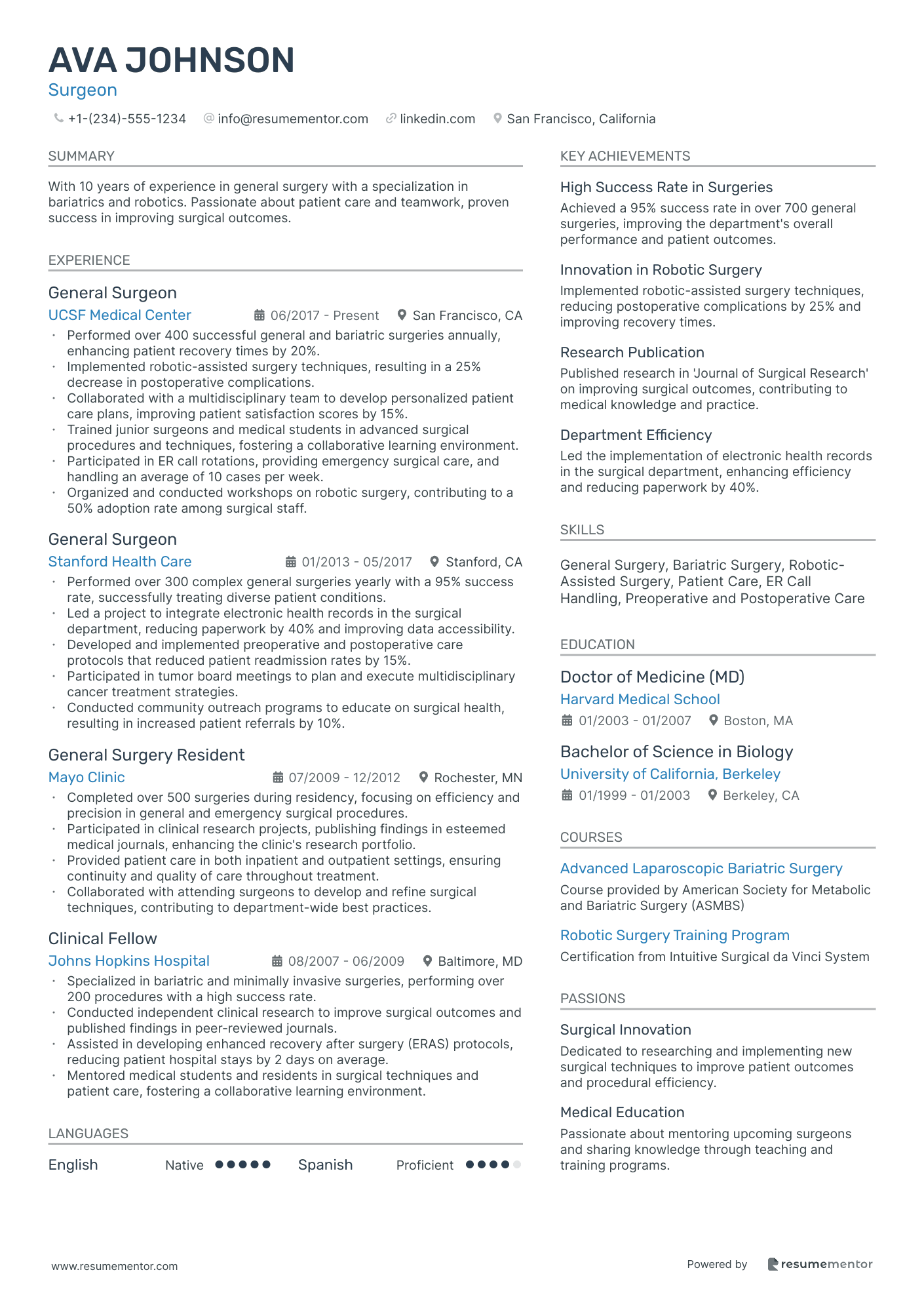33+ Doctor Resume Examples

Jul 18, 2024
|
12 min read
Revive your career with a detailed guide on writing a doctor resume. Learn tips, tricks, and must-have sections, ensuring your resume is in peak condition for your next job opportunity.
Rated by 348 people

Allergist resume sample
- •Led a team of 5 allergists and 10 support staff, improving patient care and operational efficiency, resulting in a 25% reduction in patient wait times.
- •Developed and implemented new allergy treatment protocols, leading to a 20% increase in patient satisfaction scores.
- •Collaborated with primary care physicians and specialists, resulting in a 15% increase in referrals from internal medical group.
- •Conducted over 300 allergy diagnostic tests annually, achieving a diagnostic accuracy rate of 90%.
- •Facilitated monthly training sessions for staff, enhancing procedural knowledge and patient care techniques, reducing procedural errors by 10%.
- •Oversaw the integration of telehealth services, expanding patient reach by 30% and reducing no-show rates by 10%.
- •Performed comprehensive allergy and immunology consultations, improving treatment outcomes for over 500 patients annually.
- •Developed individualized treatment plans, which led to a 85% improvement in patient-reported symptom management.
- •Collaborated with research teams to implement new clinical trials, enrolling over 100 subjects and advancing allergy research.
- •Managed patient follow-ups and care coordination, reducing hospital readmission rates by 12%.
- •Provided expert consultations for inpatient cases as needed by hospitalists, improving cross-departmental patient care strategies.
- •Executed specialty outpatient allergy care for pediatric patients, achieving a 90% rate of treatment adherence.
- •Led community outreach programs educating families about allergy prevention, reaching over 200 participants yearly.
- •Conducted skin prick testing and oral food challenges, advancing diagnostic clarity and tailoring patient-specific treatment plans.
- •Coordinated with pediatric oncologists and pulmonologists, contributing to integrated care for children with complex conditions.
- •Completed a four-year residency in allergy and immunology, acquiring hands-on experience in extensive allergy diagnostics and treatments.
- •Participated in grand rounds and case conferences, enhancing clinical knowledge and patient care skills.
- •Conducted research on novel immunotherapy techniques, contributing to publications in peer-reviewed journals.
- •Maintained patient histories and performed physical examinations, improving initial diagnostic accuracy.
Anesthesiologist resume sample
- •Led anesthesia team, ensuring compliance with the medical center's protocols, resulting in a 20% improvement in patient safety metrics.
- •Managed complex and unpredictable anesthesia situations, enhancing patient care outcomes by 15%.
- •Developed and facilitated staff education programs, reducing anesthesia-related errors by 30%.
- •Collaborated with multidisciplinary teams for preoperative and postoperative care, improving overall patient satisfaction scores by 18%.
- •Conducted clinical research on advanced anesthesia techniques, contributing to three peer-reviewed publications.
- •Optimized operating room turnover times, increasing efficiency by 25%.
- •Administered anesthesia care for high-risk surgeries, resulting in enhanced patient safety and outcomes.
- •Participated in clinical trials, leading to improved practices and techniques integrated into day-to-day operations.
- •Mentored junior staff, fostering professional development and reducing onboarding time by 40%.
- •Managed perioperative care and anesthesia protocols, leading to a 25% reduction in recovery time for patients.
- •Collaborated with surgical teams, contributing to a 15% increase in OR efficiency.
- •Specialized in cardiac anesthesia, managing cases with complex comorbidities and achieving superior patient recovery rates.
- •Contributed to the development of new anesthesia protocols, improving process standardization across the clinic.
- •Engaged in clinical research, presenting findings at national conferences and leading to publication in high-impact journals.
- •Collaborated with a multidisciplinary team to tailor patient care plans, increasing satisfaction scores by 20%.
- •Implemented pain management strategies, reducing postoperative pain by 30%.
- •Completed extensive training in general and regional anesthesia, excelling in both practical and theoretical aspects.
- •Conducted preoperative assessments, resulting in accurate anesthesia plans and higher patient satisfaction.
- •Collaborated on perioperative teams to ensure seamless patient transitions, improving overall recovery times.
- •Involved in early research projects, contributing to the enhancement of anesthesia safety procedures.
Attending Physician resume sample
- •Coordinated over 2,000 patient appointments annually, ensuring efficient scheduling and utilization of physician’s time.
- •Maintained the robotic surgery schedule, increasing operational efficiency by 30%.
- •Implemented a new financial responsibility review system, reducing patient billing errors by 15%.
- •Developed and managed a payment arrangement program that improved collection rates by 20%.
- •Improved patient communication strategies, resulting in a 98% patient satisfaction rate.
- •Created and maintained accurate block times for physicians, leading to a 25% increase in scheduling adherence.
- •Scheduled and coordinated over 1,500 multidisciplinary appointments annually.
- •Created a streamlined scheduling protocol, reducing patient wait times by 20%.
- •Managed a team of 5 schedulers, improving team efficiency by 15% through new procedures.
- •Implemented a feedback loop for scheduling practices, resulting in a 90% satisfaction rate.
- •Conducted financial responsibility reviews for all patients, ensuring all financial arrangements were completed.
- •Assisted in scheduling and coordinating robotic surgery appointments, optimizing the robotics schedule.
- •Reviewed patient financial responsibility statements, reducing discrepancies by 10%.
- •Processed payment arrangements, increasing patient adherence to financial agreements by 25%.
- •Supported physicians in maintaining accurate and up-to-date schedules, resulting in a 95% schedule adherence.
- •Handled all patient check-in and check-out procedures, improving patient flow by 15%.
- •Scheduled follow-up appointments for over 300 patients monthly, enhancing continuity of care.
- •Reviewed and confirmed insurance details for patients, leading to a 97% insurance verification accuracy.
- •Assisted in setting up payment plans, facilitating a 20% increase in on-time payments.
Cardiologist resume sample
- •Led a team of 10 cardiologists to improve patient outcomes, resulting in a 20% reduction in readmissions over 2 years.
- •Directed clinical research projects, securing $1.5 million in grants for innovative cardiology treatments.
- •Implemented a new telemedicine program, increasing patient follow-ups by 40%, enhancing patient adherence to treatment plans.
- •Mentored cardiology fellows and medical students, improving their clinical skills and knowledge in cardiology.
- •Collaborated with electrophysiologists and interventional cardiologists in multidisciplinary case reviews, enhancing treatment plans.
- •Managed a high-volume patient load, maintaining patient satisfaction scores above 90% over 3 years.
- •Developed and implemented new cardiac care protocols, resulting in a 15% decrease in procedure-related complications.
- •Provided comprehensive cardiac care to a diverse patient population, achieving excellent patient recovery rates.
- •Participated in multidisciplinary team meetings to develop effective treatment plans for complex cardiac cases.
- •Conducted community outreach programs to educate patients, increasing awareness of heart health by 30%.
- •Engaged in patient-centered care practices, consistently receiving positive feedback and high patient satisfaction scores.
- •Collaborated with primary care physicians to develop well-rounded cardiac treatment plans, improving patient adherence to care.
- •Conducted clinical cardiology research, publishing findings in peer-reviewed journals, contributing to the body's knowledge.
- •Supervised cardiology residents, providing guidance on complex cases and enhancing their diagnostic skills.
- •Facilitated training on the latest cardiac imaging technologies, increasing diagnostic accuracy by 25%.
- •Completed extensive training in interventional cardiology, gaining hands-on experience with advanced cardiac procedures.
- •Conducted investigational studies on the efficacy of new cardiac medications, presenting findings at national conferences.
- •Collaborated with senior cardiologists on complex interventional procedures, enhancing technical skills.
- •Assisted in the development and publication of clinical practice guidelines in cardiology, contributing to best practices.
Chief Resident resume sample
- •Managed a team of 15 residents, increasing overall team efficiency by 30% through effective workflow management.
- •Facilitated bi-weekly resident meetings, addressing concerns and providing feedback, resulting in a 25% improvement in resident satisfaction scores.
- •Coordinated with program administration to implement new training protocols, reducing clinical errors by 20%.
- •Led a quality improvement project, enhancing patient discharge processes, which decreased average discharge time by 15%.
- •Provided mentorship and training to junior residents, resulting in a 35% improvement in their performance assessments.
- •Served as a liaison between residents and hospital administration, effectively resolving conflicts and maintaining a cohesive work environment.
- •Oversaw daily clinical rounds with a team of 12, ensuring timely and thorough patient care, reducing patient waiting time by 20%.
- •Developed a resident wellness program, significantly improving resident well-being and reducing burnout by 30%.
- •Collaborated with multidisciplinary teams on complex cases, enhancing patient outcomes and reducing readmission rates by 15%.
- •Implemented EMR best practices, resulting in a 25% increase in documentation accuracy and compliance.
- •Delivered educational seminars to peers and junior physicians on emerging medical practices, boosting overall knowledge retention by 40%.
- •Conducted comprehensive patient assessments and treatments, maintaining a 90% patient satisfaction rate.
- •Assisted in surgical procedures, reducing operative time by 10% through efficient preparation and coordination.
- •Participated in clinical research, contributing to three published studies on innovative treatment methods.
- •Led a resident-driven initiative to streamline patient handoff processes, resulting in a 15% reduction in clinical errors.
- •Completed rotations in multiple specialties, gaining broad clinical experience and maintaining a GPA of 4.0.
- •Administered patient care under the supervision of attending physicians, achieving a 95% competency rating.
- •Contributed to a fellowship project on patient safety, implementing procedures that reduced incident reports by 20%.
- •Provided support in emergency departments, effectively managing acute patient cases and improving response time by 15%.
Dermatologist resume sample
- •Led a team of 10 dermatologists, focusing on improving patient outcomes through advanced treatment protocols, resulting in a 15% increase in remission rates.
- •Developed and implemented training programs for new staff, ensuring adherence to best practices and efficient patient care.
- •Collaborated with oncologists to devise comprehensive treatment plans for skin cancer patients, improving interdisciplinary care quality.
- •Managed administrative tasks including budgeting, staff scheduling, and performance reviews, enhancing clinic operational efficiency.
- •Participated in clinical trials, contributing to advancements in dermatological therapies and publishing findings in peer-reviewed journals.
- •Organized community outreach programs to raise awareness about skin health and preventive care, educating over 1,000 individuals annually.
- •Provided comprehensive dermatological care to more than 2,500 patients annually, specializing in the treatment and management of chronic skin conditions.
- •Implemented electronic health record (EHR) systems, improving patient documentation accuracy and reducing administrative burden.
- •Conducted biopsy and surgical excisions with a high success rate, enhancing patient recovery times and reducing complications.
- •Mentored dermatology residents, offering guidance and expertise to support their professional development.
- •Collaborated with multidisciplinary teams to design personalized treatment plans, fostering holistic patient care approaches.
- •Conducted over 150 dermatological procedures per year, refining skills in both common and complex skin treatments.
- •Engaged in pediatric dermatology research, contributing to publications and presenting findings at medical conferences.
- •Provided specialized care for pediatric patients with rare dermatological conditions, utilizing latest treatment advancements.
- •Worked closely with families to educate them about skin care management, improving patient home care adherence.
- •Completed over 10,000 clinical hours in dermatology, gaining extensive hands-on experience in patient diagnosis and treatment.
- •Participated in several impactful research projects, leading to a first-author publication in a leading dermatology journal.
- •Managed a diverse caseload, developing expertise in a wide range of dermatological conditions and treatments.
- •Collaborated with senior dermatologists in complex cases, learning advanced procedures and patient management techniques.
Endocrinologist resume sample
- •Managed a patient population of over 500 with diabetes, achieving a 12% reduction in hospitalization rates.
- •Implemented virtual care protocols, resulting in a 20% increase in patient follow-up adherence.
- •Collaborated with a multidisciplinary team to improve HbA1c levels by 15% across 200 patients.
- •Led educational sessions for patients, increasing knowledge on diabetes self-care by 25%.
- •Participated in clinical trials for new diabetes medications, contributing to a 10% improvement in treatment outcomes.
- •Streamlined electronic health record (EHR) systems to improve patient record accuracy by 18%.
- •Provided telehealth consultations for over 1,200 patients, maintaining a 95% patient satisfaction rate.
- •Developed personalized treatment plans incorporating the latest evidence-based practices, leading to a 10% improvement in patient outcomes.
- •Conducted virtual diabetes management workshops, resulting in a 15% increase in patient engagement.
- •Monitored and adjusted medication regimens remotely, reducing adverse drug reactions by 20%.
- •Collaborated with nurse practitioners and diabetes educators to build comprehensive care plans, enhancing patient education and compliance.
- •Managed chronic disease cases, leading to a 30% improvement in treatment adherence.
- •Initiated an obesity management program, resulting in a 10% weight loss among participants.
- •Produced research publications on innovative diabetes treatments, contributing to the medical community.
- •Collaborated with dietitians to create meal plans that improved patient lipid profiles by 20%.
- •Used data analytics to track patient progress, providing actionable insights that enhanced treatment efficacy.
- •Managed diabetes care for over 400 patients, achieving an A1C reduction of 12%.
- •Developed and implemented diabetes prevention programs that reduced new diagnoses by 8%.
- •Engaged in community outreach programs to raise awareness about endocrine disorders.
- •Collaborated with primary care doctors to streamline referral processes, enhancing patient care continuity.
Fellow Doctor resume sample
- •Assisted with the development and implementation of risk management strategies, leading to a 20% reduction in liability claims within the first quarter.
- •Collaborated closely with senior risk managers to support clinical staff during incidents, enhancing team response efficiency by 15%.
- •Monitored and analyzed patient feedback to identify patterns, contributing to the resolution of 30+ patient concerns in a timely manner.
- •Maintained detailed records and documentation for over 50 ongoing cases, ensuring compliance with departmental and governmental regulations.
- •Participated in the management of the Patient Bill Hold System, working with hospital leadership to make decisions regarding bill waivers for adverse events.
- •Coordinated with defense counsel to oversee aspects of litigation management, participating in strategy sessions and case evaluations.
- •Contributed to patient safety initiatives, resulting in a 10% improvement in patient satisfaction scores over three months.
- •Supported the development of early intervention programs, establishing contact with patients and families to facilitate communication.
- •Analyzed and interpreted data from incident reports to help refine policies, resulting in a 5% decrease in recurrent issues.
- •Worked on financial aspects of liability claims, maintaining an accurate claims-reserving program to ensure timely recognition of liabilities.
- •Supported over 100 families with daily needs, providing a comforting environment during their stay.
- •Organized and participated in fundraising events, raising over $10,000 to support the charity’s programs.
Gastroenterologist resume sample
- •Led a team of 5 gastroenterologists, increasing patient satisfaction scores by 20% over four years.
- •Implemented new endoscopic techniques, leading to a 15% increase in successful polypectomies.
- •Developed a patient education program that improved patient adherence to treatment plans by 25%.
- •Conducted over 1,200 endoscopic procedures annually, maintaining a complication rate below 1%.
- •Collaborated with multidisciplinary teams to optimize patient care, reducing hospital readmissions by 10%.
- •Mentored junior physicians, fostering a collaborative environment that resulted in higher team performance.
- •Performed over 1,000 diagnostic and therapeutic endoscopic procedures per year, maintaining a high success rate.
- •Played a key role in the development of clinical protocols, reducing treatment time by 15%.
- •Led educational seminars for patients, resulting in a 20% increase in treatment adherence.
- •Actively participated in clinical trials, contributing to advancements in gastroenterology research.
- •Collaborated with a cross-functional team to improve workflow efficiency, decreasing patient wait times by 10%.
- •Managed a diverse caseload of 500 patients annually, ensuring personalized care and treatment outcomes.
- •Introduced minimally invasive techniques that reduced patient recovery times by 20%.
- •Developed a community outreach program to educate on digestive health, increasing community engagement.
- •Conducted training sessions for medical staff, resulting in improved procedural skills and patient safety.
- •Assisted in over 800 endoscopic procedures annually with a focus on patient care and safety.
- •Collaborated with healthcare providers to deliver comprehensive care, resulting in a 15% increase in patient satisfaction.
- •Participated in the development of new clinical guidelines, enhancing treatment effectiveness.
- •Provided mentorship to medical students and residents, fostering a learning environment.
Geriatrician resume sample
- •Developed and implemented patient-centered treatment plans, improving elderly patient health outcomes by 15%.
- •Managed a multi-disciplinary team in providing coordinated care, resulting in a 10% reduction in hospital readmissions.
- •Conducted research on aging-related diseases, publishing findings in peer-reviewed journals and presenting at national conferences.
- •Mentored medical students and residents, enhancing the educational experience and fostering the next generation of physicians.
- •Participated in community outreach programs to educate the elderly on preventative health measures, reaching over 500 participants.
- •Led quality improvement initiatives in the clinic, resulting in a 20% increase in overall patient care efficiency.
- •Provided comprehensive care for a diverse patient population, achieving a 98% patient satisfaction rate.
- •Diagnosed and treated a wide range of illnesses, reducing the need for specialist referrals by 15%.
- •Utilized electronic medical records to improve patient data management, increasing data accuracy by 25%.
- •Collaborated with a team of healthcare professionals to create individualized patient care plans, resulting in improved health outcomes.
- •Implemented a chronic disease management program, decreasing hospital admissions for chronic conditions by 12%.
- •Completed rotations in various specialties, gaining comprehensive clinical experience in family medicine.
- •Conducted patient assessments and developed treatment plans under supervision, resulting in a 95% positive feedback from attending physicians.
- •Participated in academic research projects, contributing to publications in medical journals.
- •Provided preventive care and health education to families, improving community health indicators in the surrounding areas.
- •Delivered medical care in underserved regions, treating over 3,000 patients in humanitarian crises.
- •Led health education workshops, improving local communities' knowledge of disease prevention and hygiene practices.
- •Collaborated with local healthcare providers to establish sustainable medical practices.
- •Developed emergency response plans, enhancing the organization's readiness for future crises.
Head of Hospital Department resume sample
- •Managed acute care with a focus on pediatric patients, overseeing a daily caseload of 15+ patients per shift, and improving patient outcomes by 20%.
- •Implemented a new patient flow system that reduced average patient waiting time by 15%, resulting in higher patient satisfaction scores.
- •Led a team of 10 nurses, providing mentorship and training that decreased employee turnover by 10% and increased departmental efficiency.
- •Collaborated with doctors, social workers, and therapists to create comprehensive care plans, enhancing multidisciplinary coordination by 25%.
- •Maintained patient records with 98% accuracy, ensuring compliance with state and federal regulations.
- •Developed pediatric care plans tailored to individual patient needs, resulting in a 15% increase in successful treatment outcomes.
- •Trained new nursing staff in pediatric care protocols, enhancing team capability and patient care standards.
- •Organized and led community outreach programs, educating over 200 families on child health and preventive care annually.
- •Improved medication administration accuracy to 99.5%, significantly reducing medication errors and ensuring patient safety.
- •Managed emergency situations with a calm and efficient approach, reducing response time by 20% during critical incidents.
- •Executed comprehensive patient care for a diverse range of cases, managing 10-12 patients each shift with acute precision.
- •Implemented early warning system for infection control, reducing hospital-acquired infections by 30%.
- •Participated in quality improvement projects, enhancing patient care documentation quality by 25%.
- •Conducted thorough patient assessments and updated care plans promptly, ensuring personalized and effective care.
- •Supported nursing staff by performing essential patient care tasks, improving overall ward efficiency by 15%.
- •Assisted in patient mobility and rehabilitation exercises, contributing to a 20% improvement in patient recovery rates.
- •Maintained a clean, safe, and organized environment, adhering to strict hospital hygiene standards.
- •Provided compassionate care and emotional support to patients and their families during stressful times.
Hematologist resume sample
- •Managed inpatient care for hematology and bone marrow transplant patients, achieving a 20% reduction in readmission rates.
- •Led a multidisciplinary team in the implementation of CAR-T cell therapy, increasing treatment success rates by 35%.
- •Collaborated with researchers on several clinical trials, contributing to the publication of 5 peer-reviewed papers.
- •Coordinated outpatient care for malignant hematology patients, improving patient satisfaction scores by 30%.
- •Mentored 10 residents and fellows annually, fostering a collaborative and educational environment.
- •Optimized treatment plans using advanced technologies, increasing overall patient survival rates by 15%.
- •Provided comprehensive inpatient and outpatient care, maintaining a high standard of patient outcomes.
- •Participated in interdisciplinary care teams, resulting in integrated treatment plans for complex cases.
- •Played a key role in the development of new chemotherapy protocols, increasing treatment efficacy by 25%.
- •Conducted ongoing training for medical students and staff, ensuring up-to-date clinical practices.
- •Actively involved in the hospital's cancer research initiatives, contributing to numerous studies and trials.
- •Specialized in the treatment of hematologic malignancies, improving patient outcomes through targeted therapies.
- •Regularly reviewed and updated treatment protocols to align with the latest research findings.
- •Led a project on the integration of electronic health records, improving data accessibility and patient care coordination.
- •Engaged in patient education efforts, increasing understanding and compliance with treatment regimens.
- •Conducted research on novel treatments for hematologic disorders, publishing findings in reputable journals.
- •Developed strong diagnostic and therapeutic skills through comprehensive clinical rotations.
- •Collaborated with senior physicians on complex cases, enhancing team-based patient care.
- •Presented research at national conferences, gaining recognition and broadening professional network.
Infectious Disease Specialist resume sample
- •Led a team of SMEs and health communication specialists in the development of digital products targeting underserved populations, increasing engagement by 20%.
- •Implemented user-centered design principles for web and digital media projects, improving users’ satisfaction scores by 25%.
- •Developed and edited digital content aligning with agency messaging, resulting in consistent communication across all platforms.
- •Provided technical consultation for campaigns aimed at health professionals to improve vaccination rates, achieving a 15% increase in target regions.
- •Drove the expansion of digital communication reach to at-risk populations, leading to a 30% uptick in message accessibility.
- •Applied best digital media practices to bolster the public's trust in vaccination information, reducing misinformation spread by 40%.
- •Consulted on the development of digital strategies to disseminate credible health information, increasing website traffic by 50%.
- •Collaborated with technical specialists to optimize digital content for various audiences, boosting engagement among health professionals by 35%.
- •Oversaw the roll-out of communication initiatives to raise vaccination awareness, achieving 80% message comprehension among target demographics.
- •Led workshops on best practices for digital media use in health communication, resulting in a 15% improvement in attendee skills.
- •Produced and edited content for global health campaigns, ensuring alignment with WHO's objectives and public health priorities.
- •Crafted and optimized digital content targeted at the general public, resulting in a 25% increase in website dwell time.
- •Developed communication plans for campaigns on emergency preparedness, reaching over 500,000 individuals nationwide.
- •Monitored emerging trends in digital media to refine content strategies, improving engagement rates by 20%.
- •Provided technical advice on the implementation of social media strategies, expanding online reach by more than 30%.
- •Coordinated the production of digital health content, ensuring consistency with NIH messaging.
- •Advised on the use of user-centered design principles for web initiatives, increasing user engagement by 18%.
- •Led collaborative meetings with SMEs and technical staff to streamline communication efforts, boosting project completion rates by 20%.
- •Developed and optimized digital content aimed at healthcare professionals, leading to increased resource utilization by 25%.
Intern Doctor resume sample
- •Assisted over 50 individuals in crisis through emotional support and resource guidance, resulting in improved mental well-being.
- •Facilitated group therapy sessions for up to 10 participants, fostering a supportive community environment.
- •Conducted initial mental health assessments and provided follow-up, ensuring continuity of care for over 20 clients.
- •Collaborated with licensed professionals to develop personalized care plans for clients based on individual needs.
- •Supported research on mental health interventions, contributing to a study involving over 200 participants.
- •Collected and analyzed data, ensuring accuracy and integrity in reporting, which led to publication in a peer-reviewed journal.
- •Engaged with study participants to gather qualitative data, enhancing the depth of research findings.
- •Collaborated with a multidisciplinary team to develop actionable insights on mental health practices.
- •Facilitated community outreach programs for mental health education, reaching over 100 individuals.
- •Assisted in organizing mental health awareness events, promoting resources to over 200 attendees.
- •Conducted follow-up calls with clients to monitor progress and offer continued support.
- •Collaborated with local mental health professionals to integrate services within the community.
Junior Resident resume sample
- •Assisted in the development and implementation of a STEM curriculum for high school students, engaging over 50 students weekly.
- •Facilitated study sessions focusing on SAT prep, improving students' practice test scores by an average of 20%.
- •Coordinated weekend cultural excursions, successfully managing logistics for events attended by up to 75 participants.
- •Monitored daily academic progress and provided tutoring in mathematics and science, resulting in a 15% improvement in students' grades.
- •Organized and led group discussions on literary works, enhancing students' analytical and critical thinking skills.
- •Drafted and edited weekly newsletters communicating program updates, which improved parent and student engagement by 25%.
- •Supported the implementation of summer enrichment activities, reaching 40+ students and increasing participation rates.
- •Conducted one-on-one mentoring sessions focusing on college applications, aiding 10 students in securing university admissions.
- •Assisted with the organization of field trips and recreational activities, resulting in a well-rounded experience for students.
- •Participated in co-facilitating a weekly leadership workshop, empowering students to take active roles in community projects.
- •Delivered weekly tutoring sessions, improving students' understanding of core subjects.
- •Planned and executed creative learning activities to engage students.
- •Monitored and reported on student progress, leading to enhanced academic performance.
Medical Director resume sample
- •Led a cross-functional team of 15 members to deliver over 50 high-impact medical communication projects annually, resulting in 20% revenue growth.
- •Developed and implemented strategic medical communication plans in partnership with key clients, achieving a 98% client satisfaction rate.
- •Conducted and coordinated comprehensive medical research, contributing to the publication of 10 peer-reviewed journal articles.
- •Mentored and coached junior medical writers and project managers, improving team efficiency by 30%.
- •Facilitated workshops with healthcare professionals and thought leaders to gather insights, influencing multiple client campaigns.
- •Collaborated closely with the creative team to produce innovative content, winning three industry awards for excellence in medical communications.
- •Managed a team of 10 and played a key role in the development of 40 evidence-based communication materials per year.
- •Engaged directly with clients to understand their needs and provided strategic advice, leading to a 15% increase in repeat business.
- •Oversaw the end-to-end delivery of projects, ensuring all deliverables met high-quality standards and deadlines.
- •Executed medical advisory boards and roundtable discussions with key opinion leaders, resulting in actionable clinical insights for clients.
- •Provided scientific review and approval of content, maintaining accuracy and compliance with regulatory standards.
- •Directed the execution of 25 medical education programs annually, ensuring alignment with client objectives and timelines.
- •Collaborated with interdepartmental teams to produce engaging and educational medical content, increasing user engagement by 35%.
- •Drafted and reviewed educational materials, facilitating effective knowledge transfer to healthcare professionals.
- •Maintained strong client relationships through regular updates and consultations, enhancing client trust and loyalty.
- •Authored over 100 medical articles, abstracts, and posters, contributing to the dissemination of critical medical information.
- •Worked closely with clients to ensure the scientific integrity and clarity of medical communications.
- •Played a key role in multiple successful regulatory submissions, helping clients secure product approvals.
- •Provided in-depth literature reviews to support the development of clinical content, ensuring accuracy and relevance.
Medical Student resume sample
- •Coordinated daily activities for medical student programs, ensuring the timely execution of 10 clinical rotations every semester.
- •Collaborated with department leadership to develop innovative educational goals, resulting in a 15% increase in student satisfaction with the ObGyn clerkship.
- •Administered programs and activities directed at medical students, improving program efficiency by 20%.
- •Maintained compliance with LCME national medical education regulations, contributing to successful accreditation reviews.
- •Updated and maintained databases for 150+ students, streamlining information access for faculty and staff.
- •Organized and managed all course evaluations, achieving a 95% completion rate and gathering actionable feedback.
- •Supported the administration of graduate medical education programs, facilitating programs for over 200 residents and fellows.
- •Assisted in the development and implementation of medical student budgets, successfully managing a budget of $1 million in collaboration with chairpersons.
- •Interpreted and enforced College of Medicine program policies, ensuring all activities were compliant with state and national regulations.
- •Recruited faculty for various educational programs, increasing participation by 25% through targeted outreach efforts.
- •Educated over 500 individuals on preventive healthcare practices.
- •Organized health camps in coordination with local healthcare providers.
Nephrologist resume sample
- •Led a team of 10 healthcare professionals, achieving a 25% reduction in patient wait times and higher treatment efficacy.
- •Spearheaded a community outreach program educating over 500 individuals about kidney health and disease prevention.
- •Developed patient-specific treatment plans, resulting in a 30% increase in successful kidney transplants.
- •Implemented advanced EMR documentation processes, which improved data precision by 20%.
- •Conducted weekly educational sessions for junior doctors, enhancing their clinical skills and patient interaction quality.
- •Collaborated with multidisciplinary teams to integrate holistic care approaches, boosting overall department efficiency.
- •Improved dialysis outcomes by 15% through enhanced treatment protocols and patient follow-up schedules.
- •Conducted over 50 public health seminars, educating the community on kidney disease prevention and management.
- •Participated in clinical trials for new nephrology medications, resulting in publication of findings in medical journals.
- •Managed an acute kidney injury unit, achieving a 20% decrease in patient mortality rates.
- •Optimized use of Meditech EMR system, reducing data entry errors by 25% and streamlining patient records.
- •Performed over 200 kidney biopsies with a 98% success rate and minimal complications.
- •Developed an educational program for chronic kidney disease patients, resulting in improved compliance rates.
- •Collaborated with hematologists to create a protocol for patients with concurrent kidney diseases, enhancing treatment outcomes.
- •Reduced patient readmissions by 15% through effective post-treatment monitoring and follow-up care.
- •Assisted in the management of 120 patient cases per month, focusing on improving dialysis care and patient education.
- •Implemented a patient feedback system to gather insights, which improved patient care strategies and satisfaction.
- •Participated in multidisciplinary team meetings to create patient-centric care plans leading to improved health outcomes.
- •Trained new staff on nephrology protocols and patient interaction techniques, enhancing department efficiency.
Neurologist resume sample
- •Managed a team of 8 neurologists, improving patient throughput by 30% within the first year.
- •Implemented new EEG/EMG protocols, resulting in a 20% increase in diagnostic accuracy.
- •Developed a telemedicine program that enhanced patient access and reduced appointment wait times by 40%.
- •Conducted over 200 procedures annually, maintaining a patient satisfaction rate above 95%.
- •Collaborated with primary care and behavioral health departments to create integrated care plans for complex cases.
- •Mentored junior neurologists and fostered professional development through regular training sessions.
- •Performed over 250 EEGs and EMGs annually with a diagnostic accuracy rate of 98%.
- •Streamlined clinical workflow, reducing patient wait times by 25% and increasing clinic efficiency.
- •Led multiple research projects on neurodegenerative diseases, resulting in 3 peer-reviewed publications.
- •Provided comprehensive training and supervision to medical residents and fellows in neurology.
- •Initiated a community outreach program to educate the public on neurological health and prevention.
- •Diagnosed and treated a wide range of neurological disorders for over 1,200 patients annually.
- •Collaborated with an interdisciplinary team to develop customized treatment plans, enhancing patient outcomes.
- •Introduced advanced diagnostic tools, reducing the time to diagnosis by 15%.
- •Conducted regular interdisciplinary case reviews to ensure comprehensive care coordination.
- •Presented findings at national conferences, contributing to the field's ongoing research.
- •Performed high-volume EEG and EMG procedures under the supervision of board-certified neurologists.
- •Published 5 significant research papers on epilepsy and neuromuscular disorders.
- •Gained extensive experience in treating complex neurological conditions in a tertiary care setting.
- •Participated in multiple clinical trials, expanding understanding of treatment protocols for chronic conditions.
Obstetricians resume sample
- •Improved patient outcomes by 25% through the implementation of advanced obstetric protocols and streamlined operations, resulting in higher patient satisfaction.
- •Led a team of 10 to 15 OB/GYNs, ensuring adherence to safety standards and increasing overall efficiency of labor and delivery services.
- •Pioneered a collaborative care model with local obstetricians, reducing waiting time by 35% and improving patient throughput.
- •Conducted over 200 high-risk deliveries annually, maintaining a complication rate below the national average.
- •Mentored over 20 residents and medical students, fostering their growth and securing higher exam pass rates.
- •Implemented an EMR system, reducing administrative paperwork by 40% and enhancing accuracy in patient records.
- •Managed care for over 1,500 obstetric patients annually, consistently receiving high patient satisfaction ratings.
- •Developed customized prenatal care programs, resulting in a 20% decrease in preterm births.
- •Collaborated with a multi-disciplinary team to enhance patient care, achieving a 30% reduction in cesarean sections.
- •Participated in community outreach and education, increasing awareness of maternal health by 50% in local populations.
- •Assisted in implementing innovative surgical techniques, cutting recovery times by 15%.
- •Performed over 600 successful deliveries and managed high-risk pregnancies, achieving a 95% healthy birth rate.
- •Conducted research on gestational diabetes, contributing to a published study, and enhancing clinical practices.
- •Provided comprehensive gynecological care, increasing patient retention by 20% through personalized treatment plans.
- •Participated in weekly clinical meetings to review cases and improve care protocols, resulting in continuous improvement.
- •Completed over 1,000 hours of clinical training in obstetrics and gynecology, achieving board eligibility.
- •Assisted in managing complex labor and delivery cases, contributing to team decisions and patient outcomes.
- •Provided patient education on prenatal and postnatal care, enhancing patient understanding and compliance.
- •Developed and presented educational seminars on women’s health, benefiting both patients and medical staff.
Oncologist resume sample
- •Implemented new treatment protocols that improved patient recovery rates by 20%, resulting in higher patient satisfaction.
- •Led a multidisciplinary team to develop personalized treatment plans for over 300 patients annually.
- •Conducted clinical trials that introduced two new treatment methods, enhancing the clinic's service offerings.
- •Initiated a patient monitoring program that reduced hospital readmission rates by 15% through early intervention steps.
- •Collaborated with other departments to streamline patient intake processes, reducing wait times by approximately 25%.
- •Managed a team of 15 medical professionals, overseeing training and ongoing education to maintain high standards of care.
- •Developed and integrated new chemotherapy protocols, improving treatment success rates by 18%.
- •Initiated partnerships with local research facilities to stay updated with the latest oncology treatments.
- •Provided mentorship and training to junior physicians, resulting in higher department performance.
- •Organized patient support groups that contributed to enhanced community care and better patient morale.
- •Implemented an electronic health record system, reducing administrative errors and improving patient care efficiency.
- •Led cancer treatment programs for over 200 patients annually, achieving an 85% treatment adherence rate.
- •Conducted community outreach programs to educate the public on early detection and prevention of cancer.
- •Created a patient feedback system to continually improve the quality of care and service delivery.
- •Monitored patient progress through advanced diagnostic tools, adjusting treatment plans for better outcomes.
- •Participated in cutting-edge research that contributed to the development of novel oncology treatments.
- •Collaborated with senior oncologists to provide comprehensive care to a diverse patient population.
- •Presented findings at national conferences, raising the profile of the institution's research capabilities.
- •Engaged in interdisciplinary rounds, ensuring holistic treatment approaches for complex cases.
Ophthalmologist resume sample
- •Increased patient satisfaction scores by 25% through personalized treatment plans and follow-up care.
- •Conducted over 1,000 successful surgeries annually, specializing in cornea and external eye diseases.
- •Implemented a new patient tracking system, reducing appointment wait times by 35%.
- •Mentored 15 residents and 5 fellows each year, resulting in three acceptances to prestigious fellowship programs.
- •Developed a comprehensive training manual used across all 14 residency programs.
- •Introduced advanced diagnostic tools, improving diagnostic accuracy by 30%.
- •Performed over 800 cataract surgeries annually with a 98% success rate.
- •Decreased patient complication rates by 15% through rigorous post-operative care.
- •Led a team of 10 ophthalmologists and optometrists, ensuring high-quality patient care.
- •Established a new refractive surgery department, increasing clinic revenue by 20%.
- •Collaborated with clinical researchers to publish 10 papers on innovative eye care treatments.
- •Completed specialized training in cornea and external eye diseases.
- •Conducted clinical trials and authored research papers on new surgical techniques.
- •Presented findings at national and international ophthalmology conferences.
- •Trained under renowned specialists, honing advanced surgical skills.
- •Completed over 2,000 hours of hands-on surgical training.
- •Achieved a 95% success rate in complex eye surgeries.
- •Engaged in community outreach programs, providing free eye exams to underserved populations, resulting in early detection of eye diseases in 200 patients.
- •Contributed to a team that developed a new diagnostic protocol, reducing misdiagnosis rates by 20%.
Orthopaedic Surgeon resume sample
- •Successfully performed over 500 complex hand surgeries, improving recovery times by 20% through innovative techniques.
- •Implemented a preoperative education program, resulting in a 15% decrease in postoperative complications and enhanced patient satisfaction scores.
- •Collaborated closely with a team of five orthopaedic surgeons to develop integrated care plans, leading to a 25% increase in overall patient satisfaction.
- •Led a research project focusing on minimally invasive hand surgery, publishing findings in a peer-reviewed journal, which gained national recognition.
- •Streamlined clinical workflows by integrating cutting-edge software, cutting patient waiting times by 30%.
- •Mentored junior surgeons and medical residents, improving their surgical skills and fostering a culture of continuous learning.
- •Performed over 350 upper extremity surgeries annually, achieving a 95% patient satisfaction rate.
- •Developed a multidisciplinary approach to post-surgical rehabilitation, reducing recovery times by 18%.
- •Led a team to adopt new surgical technology, increasing procedure efficiency by 22% and reducing costs by 10%.
- •Presented at national conferences on advancements in orthopaedic surgeries, sharing insights with peers.
- •Conducted clinical trials assessing new surgical techniques, contributing to the field’s body of knowledge.
- •Completed residency by performing over 200 diverse orthopaedic procedures, refining expertise in hand and upper extremity surgeries.
- •Developed a communication protocol for intraoperative team dynamics, leading to improved surgical outcomes and efficiency.
- •Participated in a research project on bone grafting techniques, presenting findings at a medical symposium.
- •Worked with interdisciplinary teams to develop comprehensive patient care plans, enhancing overall patient care.
Otolaryngologist resume sample
- •Managed over 100 complex ear surgeries annually, achieving a 97% success rate and significantly improving patient outcomes.
- •Led a team of 5 junior otolaryngologists, providing mentorship and guidance, resulting in enhanced team performance and development.
- •Implemented new patient care protocols that reduced average recovery times by 15%, enhancing overall patient satisfaction.
- •Conducted extensive research on tinnitus, publishing findings in 3 peer-reviewed journals which led to 20% increase in treatment effectiveness.
- •Spearheaded community outreach programs in otolaryngology, educating over 200 individuals about ear health and preventative measures.
- •Performed over 500 ENT procedures annually with a focus on ear-related surgeries, maintaining an 89% patient satisfaction rate.
- •Developed a comprehensive patient education program that improved patient compliance and understanding of post-operative care by 25%.
- •Collaborated with trauma team to provide emergency ENT care, significantly reducing complication rates in critical cases.
- •Introduced a new auditory diagnostics technique that enhanced diagnostic accuracy by 30%, resulting in better treatment plans.
- •Conducted regular ENT training sessions for new staff, enhancing overall department expertise and efficiency.
- •Assisted in over 300 surgeries, including complex ear reconstructions, achieving a high success rate and improved patient outcomes.
- •Participated in clinical rounds, diagnosing and managing a wide range of ENT disorders in both inpatient and outpatient settings.
- •Presented 5 case studies at national ENT conferences, contributing to ongoing advancements in the field and receiving positive feedback.
- •Engaged in ongoing learning and certification programs to stay up-to-date with the latest procedures and treatments.
- •Conducted preliminary patient evaluations, gathering detailed medical histories and assisting in accurate diagnostics.
- •Collaborated with multidisciplinary teams to develop comprehensive treatment plans tailored to individual patient needs.
- •Assisted in weekly ENT clinics, providing essential support in patient management and procedural preparation.
- •Contributed to departmental research projects, aiding in the publication of 2 papers in notable medical journals.
Pathologist resume sample
- •Implemented innovative speech therapy programs that improved patient outcomes by 30% over a two-year period.
- •Led a team of 5 junior pathologists, providing training and mentorship, resulting in a 20% increase in overall team efficiency.
- •Conducted detailed patient assessments and developed personalized treatment plans, achieving a 95% patient satisfaction rate.
- •Collaborated with interdisciplinary teams to ensure comprehensive patient care, leading to a 10% reduction in average recovery time.
- •Organized and presented continuous education workshops for staff, resulting in enhanced clinical knowledge and skills.
- •Facilitated group therapy sessions, improving communication skills in 80% of group participants within six months.
- •Developed and implemented targeted treatment plans for 40+ patients monthly, achieving therapy goals in 75% of cases.
- •Streamlined patient documentation processes, improving efficiency by 25% and ensuring accurate and timely records.
- •Introduced new diagnostic tools that increased early detection rates of speech disorders by 15%.
- •Coordinated with family members and caregivers to tailor home programs, resulting in a significant improvement in patient adherence.
- •Conducted individual therapy sessions, yielding noticeable progress within the first three months for 85% of patients.
- •Performed speech, language, and swallowing assessments for 30+ inpatients and outpatients weekly with high accuracy.
- •Implemented efficient intervention strategies which reduced patient recovery time by 12%.
- •Collaborated with multidisciplinary teams to offer holistic treatment plans, greatly enhancing patient outcomes.
- •Provided training sessions for healthcare staff, resulting in improved patient interaction and care delivery.
- •Directed comprehensive speech therapy sessions for pediatric patients, achieving a 90% improvement rate in targeted skills.
- •Conducted research on new speech therapy techniques, integrating findings into practice, leading to better patient outcomes.
- •Managed clinical documentation with 100% compliance to regulatory requirements and improved data accuracy.
- •Facilitated family education sessions, resulting in a 15% increase in at-home therapy adherence.
Pediatrician resume sample
- •Performed comprehensive medical services to 1,500 pediatric patients annually leading to a 10% increase in overall pediatric patient volume.
- •Implemented individualized treatment plans for chronic conditions such as asthma and diabetes, which resulted in a 20% improvement in disease management outcomes.
- •Coordinated multidisciplinary care teams, enhancing the quality of care and reducing treatment costs by 15%.
- •Monitored and evaluated clinical services ensuring compliance with healthcare standards, achieving a 95% compliance rate.
- •Led patient safety and quality improvement projects that decreased clinical errors by 18% across the department.
- •Contributed to community wellness education programs, increasing public awareness on pediatric health by 25%.
- •Provided high-quality pediatric care to over 1,200 children annually, with a focus on preventive medicine.
- •Developed nutritional and wellness programs for children, resulting in a 15% increase in healthy weight outcomes.
- •Executed a new patient intake process that increased overall patient satisfaction ratings by 20%.
- •Collaborated with specialists to manage complex cases, improving treatment outcomes by 25%.
- •Facilitated pediatric CPR and first aid training for staff, enhancing emergency response preparedness.
- •Managed patient care for a pediatric ward with 800+ annual admissions, maintaining a 98% satisfaction rate.
- •Spearheaded vaccination campaigns, increasing immunization coverage by 18% within the local community.
- •Introduced telemedicine consultations, which resulted in a 30% increase in patient engagement and follow-up adherence.
- •Trained and mentored 15 medical interns, thereby enhancing clinical skills and knowledge retention.
- •Conducted pediatric rounds for inpatient care, addressing acute and chronic conditions with a 95% success rate in recovery.
- •Implemented an early childhood development screening program, identifying developmental delays 20% faster.
- •Developed family education seminars on pediatric health, leading to an informed public with 30% more participation.
- •Optimized medical record keeping, resulting in a 15% reduction in data entry errors.
Physician resume sample
- •Increased patient referral rates by 25% through establishing relationships with local primary care physicians and attending community health events.
- •Performed over 500 successful catheter ablation procedures annually, reducing patient symptoms and improving quality of life.
- •Implemented advanced diagnostic techniques, resulting in a 15% increase in the accuracy of arrhythmia detection.
- •Spearheaded a patient education initiative on electrophysiology, increasing awareness and treatment adherence by 30%.
- •Collaborated with a regional network of cardiologists to standardize care protocols, improving treatment outcomes across multiple facilities.
- •Developed a mentorship program for junior doctors, enhancing their procedural skills and confidence in electrophysiology.
- •Managed a caseload of over 200 cardiology patients, focusing on personalized treatment plans and improving patient outcomes.
- •Achieved a 10% reduction in readmission rates by implementing follow-up care protocols and ensuring patient compliance.
- •Conducted research on cardiovascular disease, resulting in 5 publications in top-tier medical journals.
- •Introduced new imaging techniques that improved diagnostic accuracy and informed more effective treatment plans for electrophysiology.
- •Led cardiac care workshops for resident doctors, fostering a learning environment and improving procedural skills.
- •Performed over 300 interventional cardiology procedures annually with a 98% success rate and minimal complications.
- •Developed and implemented a patient monitoring system that reduced post-intervention complications by 20%.
- •Coordinated with a multidisciplinary team to create comprehensive treatment plans, improving patient recovery times by 15%.
- •Pioneered a telemedicine program that increased patient access to cardiovascular care, reaching over 1,000 patients.
- •Completed an intensive fellowship in electrophysiology, gaining expertise in advanced cardiac procedures and patient management.
- •Assisted in over 200 electrophysiology studies and ablations, honing technical skills and procedural knowledge.
- •Conducted research on arrhythmia treatments, contributing to 3 publications in reputable medical journals.
- •Participated in patient case conferences, providing insights and collaborating on complex cases for optimal outcomes.
Psychiatrists resume sample
- •Developed and implemented individualized treatment plans, improving patient recovery rates by 30% over three years.
- •Conducted group therapy sessions that reduced relapse rates by 25%, supporting long-term recovery.
- •Collaborated with multidisciplinary teams to provide holistic care, resulting in a 20% increase in patient satisfaction scores.
- •Led research on treatment efficacy, publishing findings in peer-reviewed journals and enhancing clinical practice guidelines.
- •Supervised a team of five junior psychologists, providing mentorship and oversight that accelerated their professional development.
- •Implemented a new electronic health record system that increased administrative efficiency by 40%.
- •Conducted over 1000 individual therapy sessions annually, specializing in cognitive-behavioral therapy for adults and adolescents.
- •Developed patient education materials that improved understanding of treatment plans by 50%.
- •Implemented group therapy programs that saw a 30% improvement in patient coping mechanisms.
- •Participated in case management meetings, facilitating patient care coordination and reducing hospital readmission rates by 15%.
- •Provided crisis intervention services, successfully de-escalating 95% of high-risk situations.
- •Provided evidence-based psychotherapy to a diverse patient population, achieving a 25% increase in patient functioning scores.
- •Conducted psychological assessments and diagnostics with a 90% accuracy rate in treatment recommendations.
- •Collaborated with psychiatric providers to tailor medication management plans, resulting in a 20% increase in treatment adherence.
- •Educated patients and families on mental health conditions, enhancing compliance with treatment regimes.
- •Assessed, diagnosed, and treated mental health conditions, achieving a 30% reduction in symptom severity among patients.
- •Led community outreach programs, increasing mental health awareness and resource utilization by 35%.
- •Developed treatment protocols used by colleagues, standardizing care and boosting treatment success rates by 20%.
- •Facilitated interdisciplinary workshops, enhancing staff knowledge and resulting in improved patient outcomes.
Pulmonologist resume sample
- •Performed over 200 bronchoscopies annually, discovering early-stage lung conditions leading to timely interventions in 85% of cases.
- •Implemented a comprehensive asthma management program, resulting in a 15% reduction in emergency room visits over the last 3 years.
- •Lead a team of six respiratory therapists and specialists, enhancing team collaboration and improving patient care satisfaction rates by 10%.
- •Oversaw the acquisition and integration of new diagnostic testing equipment, improving test accuracy by 20%.
- •Mentored three junior pulmonologists, resulting in improved diagnostic skills and successful management of complex cases independently.
- •Collaborated with primary care providers to optimize treatment plans for patients with chronic respiratory conditions, increasing treatment adherence by 30%.
- •Conducted over 150 lung-function tests monthly, ensuring early and accurate diagnosis of respiratory diseases.
- •Developed and led a community outreach program focused on asthma education, increasing awareness and self-management among at-risk populations.
- •Utilized advanced imaging techniques to take precise tissue samples, resulting in a 25% increase in diagnostic accuracy.
- •Worked collaboratively with multi-disciplinary teams to create patient-specific care plans, leading to a 20% improvement in patient outcomes.
- •Participated in a hospital-wide initiative to reduce readmission rates for COPD patients, achieving a 12% reduction over two years.
- •Performed detailed diagnostic bronchoscopies, increasing early detection rates of pulmonary diseases by 15%.
- •Collaborated on clinical research projects, contributing to publications on advanced diagnostic methods for lung disorders.
- •Engaged in patient education initiatives, resulting in a 20% increase in patient adherence to prescribed treatments.
- •Administered complex lung-function tests, advancing the center's capability to diagnose and treat rare respiratory conditions.
- •Completed comprehensive training in pulmonary diagnostics and therapeutic procedures, including advanced bronchoscopy techniques.
- •Worked with a mentor to design and implement patient care plans, resulting in improved management of chronic respiratory conditions.
- •Participated in multi-disciplinary rounds, contributing to collaborative care strategies and improved patient outcomes.
- •Conducted a quality improvement project that identified key areas for enhancing patient care efficiency, leading to a 10% increase in throughput.
Radiologist resume sample
- •Spearheaded the implementation of Genius™ 3D Mammography™, increasing early breast cancer detection rates by 30% within the first year.
- •Oversaw the diagnostic imaging department, managing a team of 15 radiologists, resulting in a 25% improvement in team efficiency.
- •Performed over 200 complex interventional radiology procedures, with a 95% patient satisfaction rate.
- •Optimized the PACS system by integrating PowerScribe 360, reducing report turnaround time by 20%.
- •Developed and conducted training programs for resident radiologists, enhancing skillsets and reducing diagnostic errors by 15%.
- •Led an initiative to upgrade two MRI scanners to Siemens models, resulting in a 40% increase in imaging speed and accuracy.
- •Conducted over 5,000 radiologic examinations annually, maintaining a diagnostic accuracy rate of 98%.
- •Collaborated with the oncology department on PET CT scans, leading to a 20% improvement in cancer detection rates.
- •Implemented a continuous improvement program, reducing patient wait times for diagnostic imaging by 15%.
- •Managed procurement and setup of Philips US and interventional equipment, enhancing procedural efficiency by 30%.
- •Authored 10 peer-reviewed research articles on advancements in radiology, contributing to the department's academic prestige.
- •Executed diagnostic radiology in all modalities, contributing to an 18% increase in early detection of disease.
- •Participated in the clinical trials for the latest 3T MRI scanner technology, enhancing diagnostic precision.
- •Implemented new imaging protocols that streamlined workflow, increasing department throughput by 10%.
- •Regularly performed needle biopsies and thoracentesis, achieving a success rate of 99% with minimal complications.
- •Mentored junior radiologists and medical students, boosting their diagnostic assessment skills by 25%.
- •Provided exemplary diagnostic services, interpreting over 8,000 imaging studies per year with high accuracy.
- •Led a project to integrate PACS with electronic medical records, improving access to imaging data by 50%.
- •Engaged in interventional radiology procedures with a focus on minimal invasiveness, increasing patient recovery speeds.
- •Participated in hospital outreach programs, educating the community on the importance of regular diagnostic screenings.
Senior Resident resume sample
- •Oversaw daily operations of a 500-unit residential complex, increasing overall tenant satisfaction by 15% through strategic management and community engagement.
- •Implemented advanced CRM software, resulting in a 30% reduction in response time to resident inquiries and maintenance requests.
- •Led a cross-functional team of 20, optimizing staffing processes and reducing turnover by 20% via a tailored professional development program.
- •Pioneered a sustainability initiative that reduced operational costs by 15%, promoting green practices and enhancing the property’s appeal.
- •Improved on-site amenities and services, directly contributing to a 10% increase in occupancy rates over two years.
- •Negotiated vendor contracts and managed budgets effectively, realizing savings of $150,000 annually without compromising service quality.
- •Managed operations for a 400-unit apartment complex, maintaining a 95% occupancy rate through targeted marketing and resident retention strategies.
- •Introduced a customer feedback system, resulting in a 20% improvement in service response times and higher resident satisfaction.
- •Coordinated large-scale renovation projects, completing them on time and under budget, enhancing property value and appeal.
- •Developed a comprehensive crisis management plan, ensuring resident safety and rapid response to emergencies.
- •Drove a 25% increase in lease renewals by implementing loyalty programs and exceptional resident services.
- •Directed daily operations of a 300-unit residential community, enhancing resident engagement and achieving a 10% increase in occupancy.
- •Streamlined maintenance processes, reducing average repair times by 40%, significantly improving resident satisfaction.
- •Executed successful marketing campaigns, boosting new lease agreements by 18% over a two-year period.
- •Focused on fiscal responsibility, managing budgets efficiently and reducing operational expenses by 15%.
- •Supported the Property Manager in overseeing a 250-unit complex, contributing to a 15% increase in lease renewals.
- •Improved tenant relations through effective communication and problem-solving, achieving a resident satisfaction rate of 90%.
- •Assisted in managing property budgets, resulting in a 10% reduction in unnecessary expenditures.
- •Facilitated community events and activities that enhanced resident engagement and fostered a strong sense of community.
Surgeon resume sample
- •Performed over 400 successful general and bariatric surgeries annually, enhancing patient recovery times by 20%.
- •Implemented robotic-assisted surgery techniques, resulting in a 25% decrease in postoperative complications.
- •Collaborated with a multidisciplinary team to develop personalized patient care plans, improving patient satisfaction scores by 15%.
- •Trained junior surgeons and medical students in advanced surgical procedures and techniques, fostering a collaborative learning environment.
- •Participated in ER call rotations, providing emergency surgical care, and handling an average of 10 cases per week.
- •Organized and conducted workshops on robotic surgery, contributing to a 50% adoption rate among surgical staff.
- •Performed over 300 complex general surgeries yearly with a 95% success rate, successfully treating diverse patient conditions.
- •Led a project to integrate electronic health records in the surgical department, reducing paperwork by 40% and improving data accessibility.
- •Developed and implemented preoperative and postoperative care protocols that reduced patient readmission rates by 15%.
- •Participated in tumor board meetings to plan and execute multidisciplinary cancer treatment strategies.
- •Conducted community outreach programs to educate on surgical health, resulting in increased patient referrals by 10%.
- •Completed over 500 surgeries during residency, focusing on efficiency and precision in general and emergency surgical procedures.
- •Participated in clinical research projects, publishing findings in esteemed medical journals, enhancing the clinic's research portfolio.
- •Provided patient care in both inpatient and outpatient settings, ensuring continuity and quality of care throughout treatment.
- •Collaborated with attending surgeons to develop and refine surgical techniques, contributing to department-wide best practices.
- •Specialized in bariatric and minimally invasive surgeries, performing over 200 procedures with a high success rate.
- •Conducted independent clinical research to improve surgical outcomes and published findings in peer-reviewed journals.
- •Assisted in developing enhanced recovery after surgery (ERAS) protocols, reducing patient hospital stays by 2 days on average.
- •Mentored medical students and residents in surgical techniques and patient care, fostering a collaborative learning environment.
Writing a doctor resume can be as complex as diagnosing an elusive medical condition. Often, you spend so much time saving lives that crafting the perfect resume might feel like foreign territory. The medical field's demands leave little room for resume-building skills, making the process overwhelming. Many of you may wonder how to capture your vast experience and expertise in a concise manner. Choosing the right words and format could be as daunting as performing surgery without a scalpel. This guide will help you navigate this crucial task, ensuring your resume stands out in a competitive job market. Just like a patient's chart, your resume needs to be clear, concise, and compelling.
Your resume template can make or break the first impression you leave on potential employers. The right template ensures your qualifications and achievements are highlighted effectively. It can guide you in structuring your experience in a way that's easy to read and impactful. Think of it as a roadmap that helps employers quickly see why you are the best fit for the job. Don't leave your career to chance; choose a template crafted for success.
We also offer more than 700 resume examples to inspire and guide you through the process.
Key Takeaways
- Your resume template is crucial in making a strong first impression and should highlight your qualifications and achievements effectively.
- A doctor resume should clearly showcase medical expertise, patient care skills, and relevant experience while including sections like Contact Information, Professional Summary, Education, Certifications, Work Experience, and Skills.
- The reverse-chronological format is the best choice for a doctor’s resume, highlighting recent experiences first, and it’s important to save your resume as a PDF to maintain formatting.
- When writing the experience section, detail specific achievements and use a "skill-action-result" format to clearly convey your impact and contributions.
- Additional sections such as Research Experience, Publications, Professional Memberships, Language Skills, Hobbies, and Volunteer Work can enhance your resume by highlighting specialized expertise and a well-rounded profile.
What to focus on when writing your doctor resume
A doctor resume should clearly showcase your medical expertise, patient care skills, and relevant experience. Highlight your education, certifications, and any special training that sets you apart. Evidence of your contribution to research or published work can also impress recruiters. To boost your resume's impact, consider including bullet points such as:
- Specific patient care achievements
- Leadership roles in medical teams
- Awards or honors in your field
- Continuing education or specialized courses
Must have information on your doctor resume
When crafting a doctor’s resume, it's essential to include sections that showcase your qualifications and experience clearly. Include the following must-have resume sections:
- Contact Information
- Professional Summary
- Education and Credentials
- Work Experience
- Skills
- Licenses and Certifications
Additional sections such as Research Experience, Publications, and Professional Memberships can also enhance your resume by highlighting specialized expertise and ongoing professional development. These sections can help you stand out in a competitive field.
Which resume format to choose
When crafting a resume for a doctor, the best format is the reverse-chronological format. This format highlights your most recent experiences first, which is critical in a field like medicine where recent practice and expertise have significant value. For a modern touch, use fonts like Rubik and Montserrat instead of the outdated Arial or Times New Roman. Always save your resume as a PDF to ensure consistent formatting across different devices. Maintain standard 1-inch margins to keep your resume clean and readable. Clearly labeled sections with headings are vital for both readability and passing through ATS filters.
A doctor resume should include the following sections: Contact Information, Professional Summary, Education, Licenses and Certifications, Professional Experience, Skills, Research and Publications, and Professional Affiliations. Including these sections ensures that you present a comprehensive and professional profile to potential employers.
Resume Mentor's free resume builder effortlessly manages all these details, ensuring you have a polished and effective resume.
What resume format do employers prefer?
Is there a resume format suitable for college grads?
What is simple resume format?
What are all the resume formats?
How to write a quantifiable resume experience section
Writing the experience section of a doctor's resume can feel like a challenge. However, with a few guidelines, you can present your work history in a way that stands out. The resume order should start with your most recent position and work backward. Generally, you should cover the last 10-15 years of your career. Include job titles that are relevant to your current job goals. Tailoring your resume to fit the job you are applying for is crucial. Use action words that clearly define your achievements, such as "diagnosed," "managed," or "improved."
Now, into the examples. Follow the JSON format provided:
- •Responsible for patient care and monitoring
- •Worked with medical staff to provide treatments
- •Maintained patient records
- •Diagnosed common illnesses
- •Assisted senior doctors in surgeries
- •Participated in patient education programs
The first example is poorly written. It lacks specific achievements and contains vague descriptions such as "Responsible for patient care and monitoring." It does not provide any evidence of the impact you had in your role. There are no quantifiable results or success indicators, making it less compelling.
Now, let's see an outstanding example:
- •Increased patient satisfaction rates by 25% through improved care protocols
- •Led a team of 100+ doctors and nurses, enhancing team collaboration
- •Implemented a new electronic health record system, reducing errors by 30%
- •Performed over 1,000 successful surgeries
- •Reduced surgical complications by 15% through innovative techniques
- •Mentored junior surgeons, fostering a culture of continuous learning
The second example is powerful because it focuses on measurable achievements. It states what was done, how it was done, and the results, such as "Increased patient satisfaction rates by 25% through improved care protocols." Using numbers helps to paint a clear picture of your contributions and impact in your roles.
Remember to always highlight your accomplishments and quantify your results wherever possible. This approach will make your resume impactful and noteworthy.
Doctor resume experience examples
Welcome to our journey through the world of medical resumes! Here, you'll uncover tips and tricks to make your experience shine brighter than a freshly sterilized scalpel!
Achievement-focused
Highlight your key achievements in this format. Demonstrate tangible accomplishments that can impress potential employers and demonstrate your value.
Senior Cardiologist
Healthy Heart Hospital
June 2018 - Present
- Developed a unique treatment protocol for heart surgery patients, reducing recovery time by 20%
- Published 5 peer-reviewed articles in top medical journals
- Named 'Doctor of the Year' at hospital's annual awards
Skills-focused
Show off your medical skills. Emphasizing specific skills can highlight your expertise and help you stand out.
Pediatric Surgeon
Children's Medical Center
March 2019 - Present
- Proficient in minimally invasive surgical techniques
- Experienced in pediatric trauma care and emergency surgery
- Skilled in patient and family communication, ensuring comprehensive care
Responsibility-focused
Present your core responsibilities in your role. This can showcase your capability to handle crucial tasks.
Chief of Surgery
Metro General Hospital
August 2015 - July 2021
- Oversaw a team of 30 surgeons and medical staff
- Managed the surgery department’s budget and resource allocation
- Led bi-monthly training sessions to improve surgical techniques
Project-focused
Detail key projects you've managed or participated in. This can demonstrate your ability to execute and lead initiatives.
Project Lead
City Health Authority
January 2020 - December 2020
- Developed and implemented a comprehensive plan to reduce infant mortality rates
- Collaborated with local health departments and NGOs
- Achieved a 15% reduction in infant mortality over one year
Result-focused
Showcase the impact of your work. Focus on the actual results of your efforts.
Oncologist
Cancer Care Institute
April 2017 - Present
- Improved patient survival rates by 10% through tailored treatment plans
- Increased patient satisfaction scores by 30% within two years
- Reduced chemotherapy adverse effects through innovative techniques
Industry-Specific Focus
Highlight specialized knowledge in a specific medical industry.
Orthopedic Surgeon
Sports Medicine Hospital
June 2013 - Present
- Specialized in sports injuries and joint replacement surgeries
- Performed over 500 successful joint replacement surgeries
- Consulted with professional sports teams on player injuries and rehabilitation
Problem-Solving Focused
Detail your problem-solving capabilities. Highlight your ability to address and resolve issues.
Emergency Room Physician
City Hospital
September 2016 - Present
- Successfully handled high-pressure situations in a busy ER environment
- Developed protocols to streamline emergency patient triage
- Reduced patient wait times by 40% through innovative scheduling
Innovation-focused
Showcase your innovative practices. Highlight how your innovations improved patient care or hospital operations.
Neurologist
NeuroHealth Clinic
January 2018 - Present
- Pioneered a new MRI technique to better diagnose neurological disorders
- Implemented a telehealth program to monitor patients remotely
- Conducted research leading to a breakthrough in treating chronic migraines
Leadership-focused
Emphasize your leadership roles and responsibilities. Highlight how you managed teams and resources effectively.
Head of Cardiology Department
Heart Health Hospital
May 2014 - November 2020
- Led a team of 20 cardiologists and supporting staff
- Implemented ongoing training programs to improve team skills
- Developed departmental policies and medical standards
Customer-focused
Demonstrate your commitment to patient care and satisfaction. Highlight your patient interactions.
Family Physician
Community Health Clinic
July 2015 - Present
- Provided personalized care to a diverse patient population
- Achieved a 95% patient satisfaction rate
- Coordinated with specialists to ensure comprehensive care
Growth-focused
Highlight your role in driving growth for your department or practice. Focus on initiatives that led to expansion or improvement.
Dermatologist
Skin Health Center
March 2016 - Present
- Expanded dermatology practice, doubling the number of patients served
- Introduced new skincare treatments, increasing revenue by 20%
- Mentored junior dermatologists to ensure high practice standards
Efficiency-focused
Detail your efforts to improve efficiency in your practice or department. Highlight successful initiatives.
Radiologist
Metro Imaging Center
February 2017 - Present
- Streamlined imaging processes, reducing patient wait times by 30%
- Implemented EMR system, improving data retrieval efficiency
- Optimized appointment scheduling to maximize department utilization
Technology-focused
Showcase your experience with medical technology. Highlight your proficiency and any improvements you instituted.
Medical Technologist
Starlight Medical Labs
August 2018 - Present
- Implemented advanced diagnostic tools to improve patient outcomes
- Trained staff on new EHR software, reducing documentation errors by 25%
- Maintained laboratory equipment, ensuring operational efficiency
Collaboration-focused
Highlight your teamwork skills. Show how you work with others to achieve common goals.
General Practitioner
Family Health Practice
October 2014 - September 2020
- Collaborated with specialists to create comprehensive patient care plans
- Participated in multidisciplinary team meetings to discuss complex cases
- Facilitated communication between patients and various healthcare providers
Training and Development focused
Detail your involvement in training and development. Highlight programs you’ve led or participated in.
Clinical Educator
Hospital Education Department
May 2017 - Present
- Developed and led ongoing training sessions for medical staff
- Created educational materials to assist with staff development
- Mentored new healthcare professionals, ensuring their smooth transition
How to write a doctor resume if you have little to no experience
So you're feeling like a stethoscope without a heartbeat when it comes to your resume? Don't worry, even if you’re new to the medical field, you can still craft a compelling doctor resume. Let’s take a closer look at how you can make that happen.
First, start with a strong heading that includes your name, contact information, and professional social media links. Your education section will be crucial, so list your medical school, its location, and your graduation date. Highlight your most recent or relevant degree first.
Focus on your skills and clinical rotations next. You learned a lot during your training, so list specific skills and relevant experiences. These can help show your capabilities and strengths. Make sure to include any internships, externships, or volunteer work where you practiced medicine.
Don't forget certifications and licenses. These are essential for showing your credibility. Include all relevant details, even if you think they're minor.
Use action verbs in your bullet points to describe your roles and responsibilities. Keep your descriptions clear and concise. Show how your experiences, no matter how small, contribute to your readiness for the job.
Extracurricular activities can also add value. List any clubs, societies, or community involvement that relate to medicine. These experiences show you’re well-rounded and dedicated.
Even if you don't have heaps of experience, focus on what you do have. Emphasize your education, skills, and willingness to learn. Your enthusiasm and dedication can go a long way in making a great impression.
Best practices about a doctor work experience section
How can I make my resume more quantifiable?
How should I write my doctor resume if I have no experience?
What should I write in my experience section?
What are some common responsibilities listed in a doctor resume?
- Diagnosing and treating patients
- Maintaining patient records
- Collaborating with other healthcare professionals
- Prescribing medication
- Conducting medical research
- Performing surgeries
What are the most common achievements listed in a doctor resume?
- Improved patient care by X%
- Received a medical award or recognition
- Published research in a medical journal
- Led a successful medical project
- Increased departmental efficiency
Doctor experience bullets that revolve around responsibilities?
- Diagnosed and treated a wide range of medical conditions
- Maintained comprehensive patient records
- Collaborated with multidisciplinary teams to provide high-quality care
- Prescribed and managed medication for patients
- Performed complex medical procedures and surgeries
Write your doctor resume summary section
When crafting a resume summary as a doctor, you must be concise and highlight the most relevant information. This section should quickly convey your expertise, experience, and value.
In your summary, focus on your specialized skills, years of practicing, notable achievements, and your approach to patient care. Use strong, action-oriented words and avoid unnecessary jargon.
The difference between a summary and other terms like resume objective, resume profile, and summary of qualifications lies mainly in their focus. A resume summary highlights your significant achievements and experience, presenting your professional value. A resume objective states your career goals and why you are seeking the job. A resume profile offers a concise look at your skills and experiences. A summary of qualifications is a bullet-point list of your most relevant skills and experiences.
Now, let's look at two examples of resume summaries.
The first example falls short in several ways. It is vague and lacks specific details. It does not mention any specializations, achievements, or the exact number of years of experience. Phrases like "a lot of experience" are unclear and unconvincing.
The second example is far better. It provides specific details, mentioning 10 years of experience and a specialization in cardiology. It highlights a proven track record and key skills like non-invasive procedures and patient education. It also indicates a commitment to personalized care and ongoing education.
A well-crafted resume summary can make a strong first impression and set the stage for your entire resume. Aim for clarity, specificity, and relevance to the job you are applying for.
Listing your doctor skills on your resume
Writing a skills section for your doctor resume is crucial. Skills can be a standalone section or integrated into other parts like Experience and Summary. This strategy helps highlight your strengths and soft skills, whereas hard skills refer to specific knowledge and abilities, such as medical procedures, tools, and technologies.
When crafting your resume, remember that your skills and strengths can also serve as resume keywords. These terms help your resume pass through applicant tracking systems and grab the attention of hiring managers.
Consider this JSON example of a standalone skills section:
This example is effective because it is concise, relevant, and uses keywords that hiring managers search for. This short list communicates essential skills quickly. It's tailored to a doctor's role specifically, helping to highlight your expertise.
Best hard skills to feature on your doctor resume
Hard skills for a doctor should clearly communicate your medical proficiency and technical expertise. Here are 15 in-demand hard skills to consider:
Hard Skills
- Electronic Medical Records (EMR)
- Diagnostic Imaging
- Surgical Tools
- Laboratory Equipment
- Telemedicine Platforms
- Medical Coding
- Phlebotomy
- Anesthesia Administration
- Patient Management Software
- EKG Machines
- Genomic Sequencing Tools
- Respiratory Therapy Equipment
- Ultrasound Machines
- Medical Billing Software
- Patient Monitoring Systems
Best soft skills to feature on your doctor resume
Soft skills for a doctor should communicate your ability to interact effectively with patients and colleagues. Here are 15 in-demand soft skills to consider:
These skills make your resume stand out and demonstrate your comprehensive expertise in both patient care and technical medical practices.
Soft Skills
- Communication
- Empathy
- Teamwork
- Critical Thinking
- Problem-Solving
- Time Management
- Adaptability
- Stress Management
- Conflict Resolution
- Attention to Detail
- Leadership
- Decision Making
- Emotional Intelligence
- Patience
- Active Listening
How to include your education on your resume
An education section is an important part of your doctor resume. This section should be tailored to the job you are applying for, and any irrelevant education should not be included. When listing your degree, include the full title of the degree, the institution's name, and the dates attended. If your GPA is strong, typically 3.5 or higher, it can be beneficial to include it. To list cum laude honors, it should follow your degree title in parentheses.
Here is an example of a poorly written education section:
This example is bad because it includes irrelevant education and lacks clarity and details about achievements.
Here is an outstanding doctor resume education section:
This example is good because it includes relevant education, honors, GPAs, and full details, making it clear and impressive.
How to include doctor certificates on your resume
Including a certificates section in your doctor resume can significantly boost your credibility and showcase your specialized skills. Certificates validate your qualifications and demonstrate your commitment to continuing education. List the name of the certification first. Always include the date you received the certification. Add the issuing organization to lend authority to the certification. If space allows, you can also briefly describe the relevance or significance of the certification.
You can place your certifications in a dedicated section for better visibility. Alternatively, certificates can also be included in the resume header to create an immediate impact. For example:
This example is strong because the certifications are directly relevant to the medical field. "Board Certified in Internal Medicine" assures employers of your expertise in a core area, issued by a reputable authority. "Advanced Cardiac Life Support (ACLS)" demonstrates your preparedness for emergencies, backed by a trusted organization. Both certificates are recent and relevant, making your resume compelling.
Extra sections to include in your doctor resume
Crafting a standout resume as a doctor requires more than just listing your professional qualifications. It helps to include various sections that provide a broader picture of your abilities, interests, and personality.
- Language section — List multiple languages you know fluently to show your ability to communicate with diverse patients. This skill enhances patient care and can be a valuable asset in multicultural healthcare settings.
- Hobbies and interests section — Highlight your personal activities like running marathons or playing a musical instrument. This section can make you more relatable and give hiring managers insight into your work-life balance.
- Volunteer work section — Mention any unpaid healthcare services you have provided, such as community health screenings or international medical missions. This showcases your dedication to healthcare and your willingness to serve underrepresented communities.
- Books section — List relevant medical literature and other genres you read to display your commitment to continuous learning. This section indicates that you are well-read and keep yourself updated in your field.
Pair your doctor resume with a cover letter
A cover letter is a document you send with your resume when applying for a job. It introduces you to the employer, explains why you're interested in the position, and highlights your key skills and experiences. A cover letter can help you stand out by providing a more personal touch than a resume alone. It allows you to showcase your enthusiasm and fit for the role.
For a doctor, a cover letter should focus on your medical experience, patient care skills, and any specialized training you've received. Mentioning your years in medical school, residency, and any fellowship can show your dedication and qualifications. Discuss how you have improved patient outcomes or contributed to research. Tailor your letter to the specific hospital or clinic, noting why you want to work there and how you align with their values.
Try Resume Mentor's cover letter builder to easily create a professional cover letter tailored to you. Its smooth design makes crafting your cover letter simple, and exporting as a PDF helps keep your formatting and content secure. Start now and set yourself apart from other applicants!
Ella Green
Dallas, Texas
+1-(234)-555-1234
help@resumementor.com
Related Articles

Continue Reading
Check more recommended readings to get the job of your dreams.
Resume
Resources
Tools
© 2026. All rights reserved.
Made with love by people who care.

